Rickubis Bird Page #8: Owls and Falcons (without
Caracaras)!
This
page was born 04/17/2015. Rickubis designed it.
(such as it
is.) Last update: 04/17/2023
Images
and contents on this page copyright ©2002-2023 Richard M. Dashnau
Go back to my home page, Welcome
to rickubis.com
Go
back to the RICKUBISCAM
page.
----------------------------------
Welcome
to Brazos Bend State Park. That's me on the trail. One of the most
popular
reasons for people to visit BBSP is to see the birds. Although *I*
started
going to the park mainly for the alligators, one
cannot be there for long
without learning to enjoy the birds. Over the years, I've captured a
few
pictures and video clips of them, and here they are. I've collected all
my shots of Owls and Falcons onto
this page.
On 04/02/2023
At BBSP, I only
had an hour and a half to spend on the trail in the morning. I was
treated to a few choruses of alligators bellowing. And
just East of the Spillway Bridge, I noticed a bird at the top of a tree
off
to the South. Through binoculars, it looked like it might be
an
Osprey (I thought I recognized a
black mask on its face),
but I wasn't sure, so I took some pictures. Once I got a
better
look, I discovered that I had been watching a Peregrine Falcon!
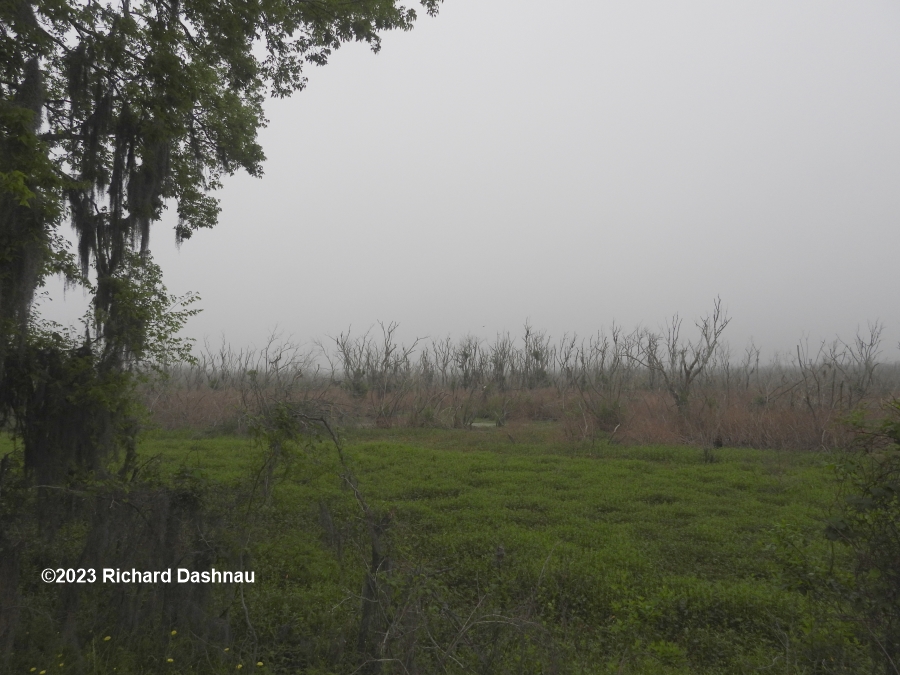
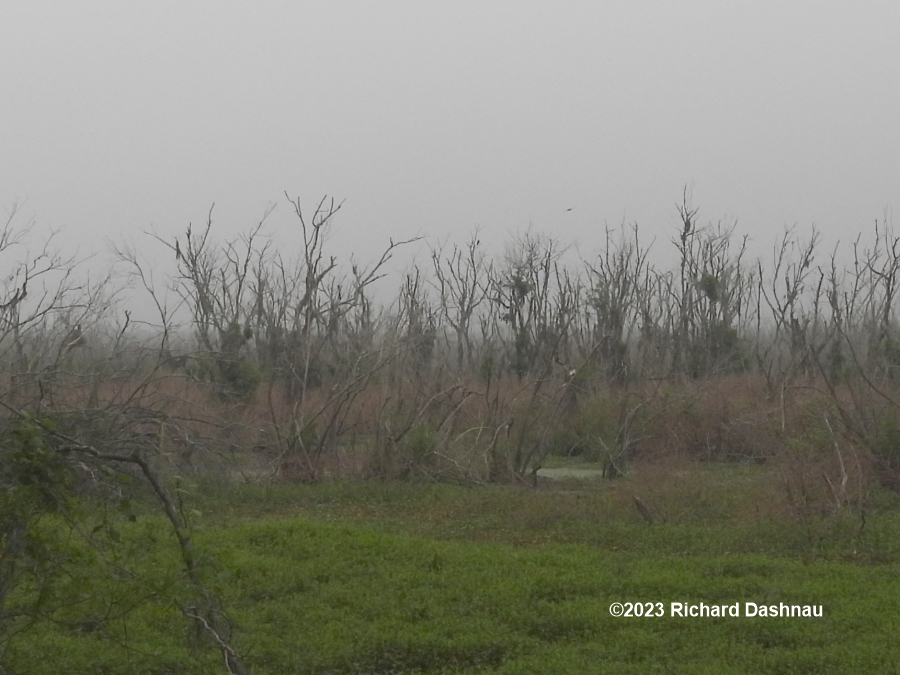
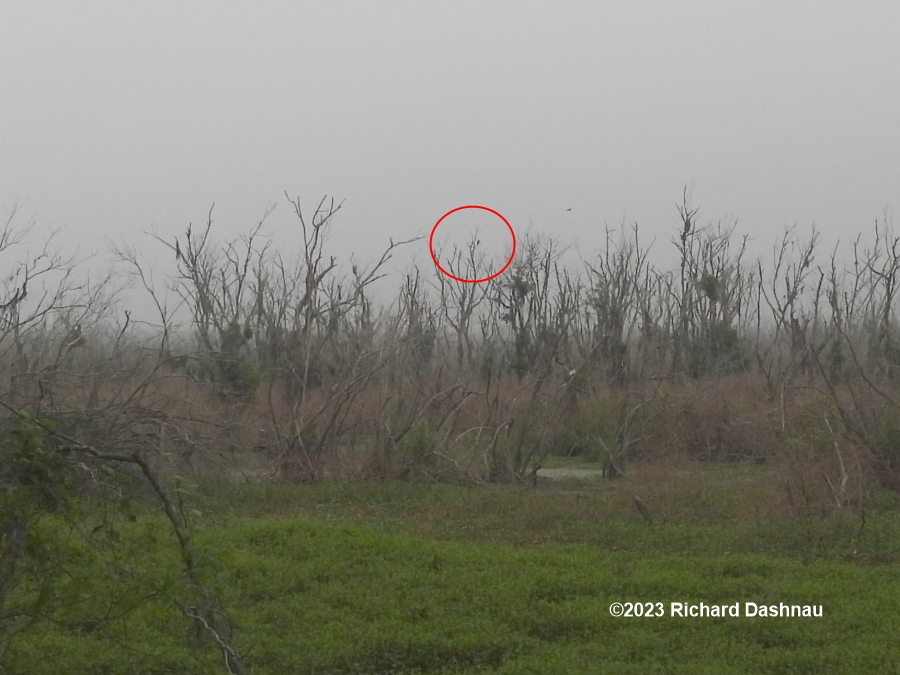
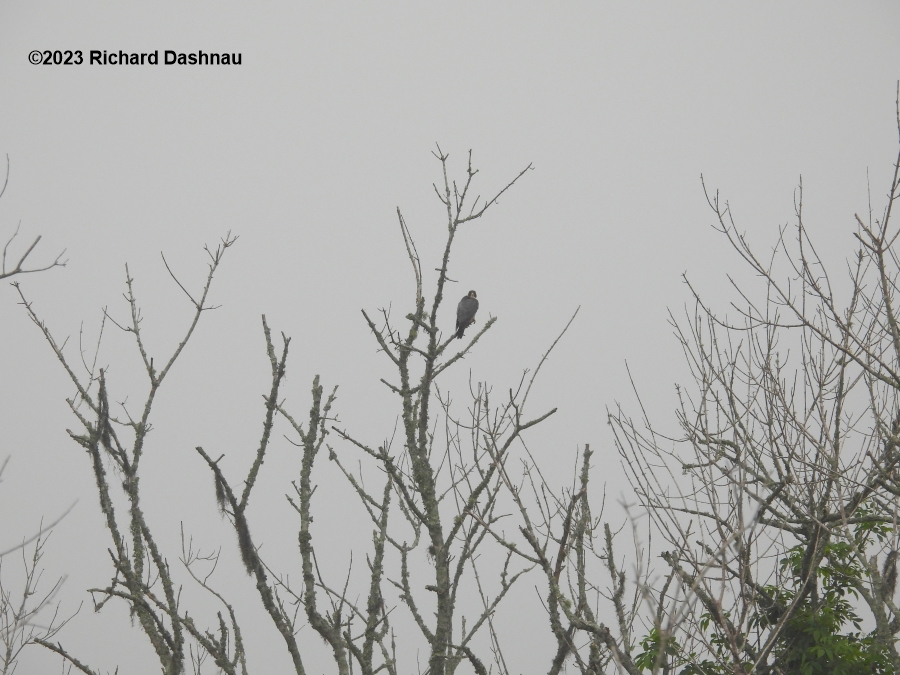
It
wasn't doing very much-just looked around-but I took many pictures
showing the Falcon at various angles to help with identification.
Unfortunately, I had to leave before
it took off, so did't get any pictures of that.
Still...Peregrine Falcon!
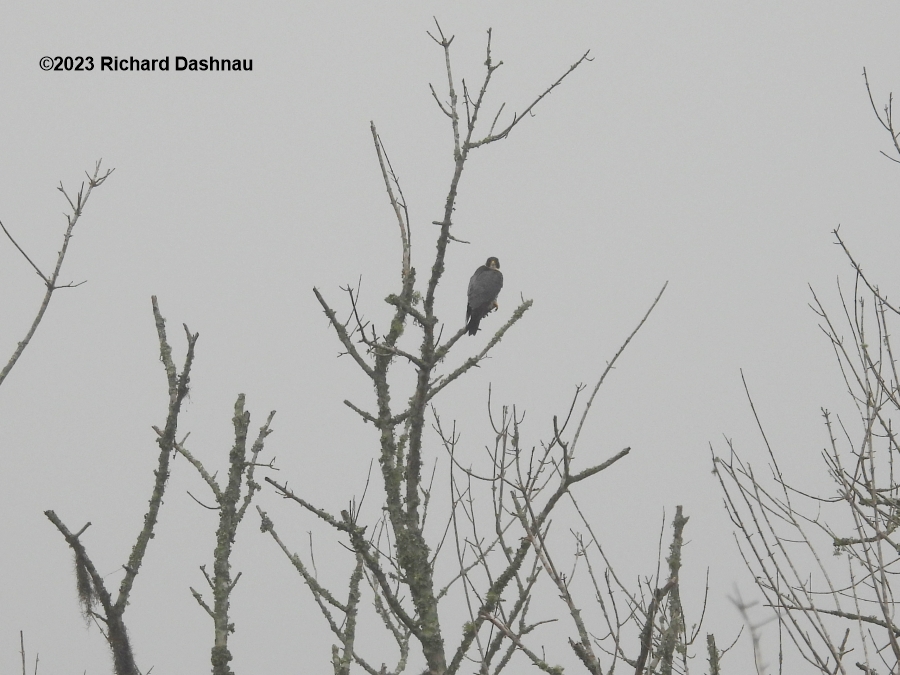
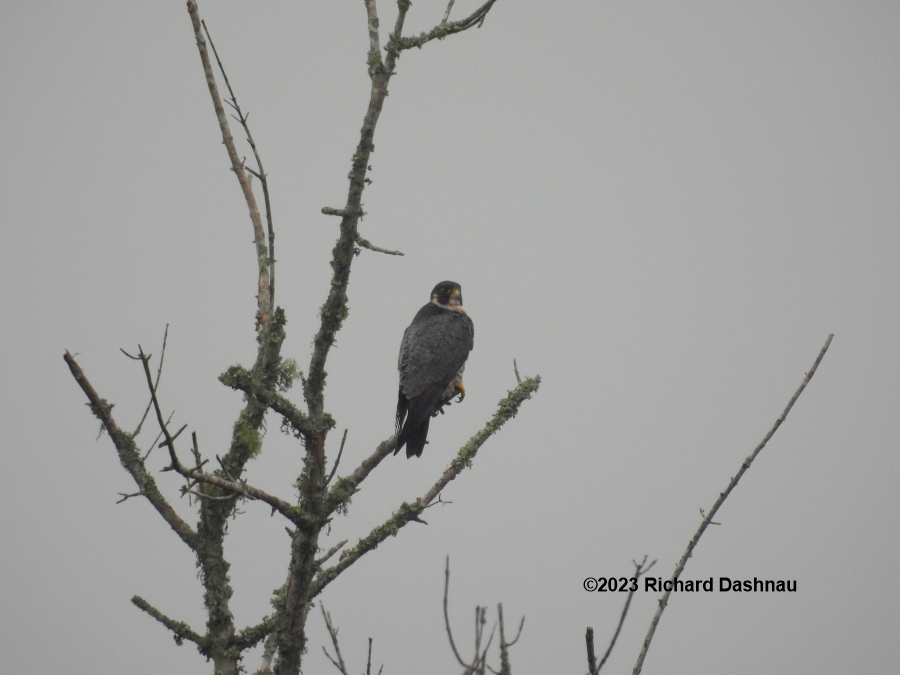
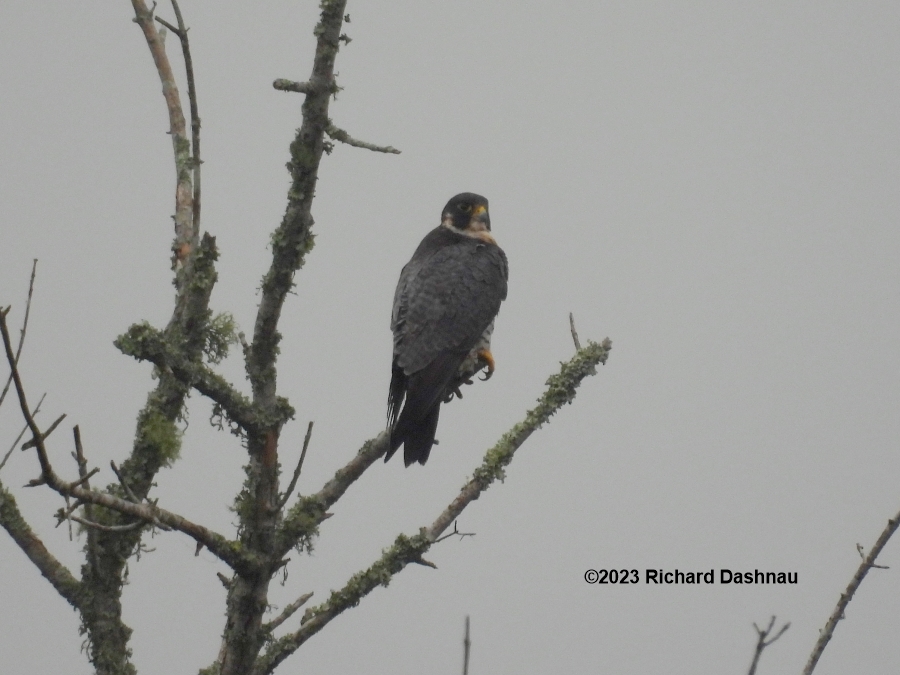
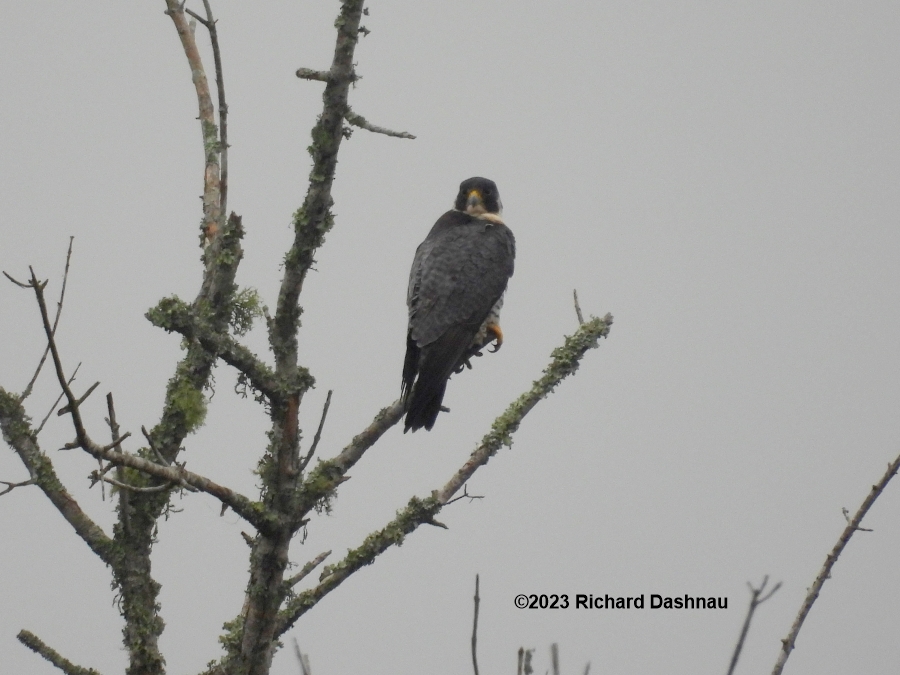
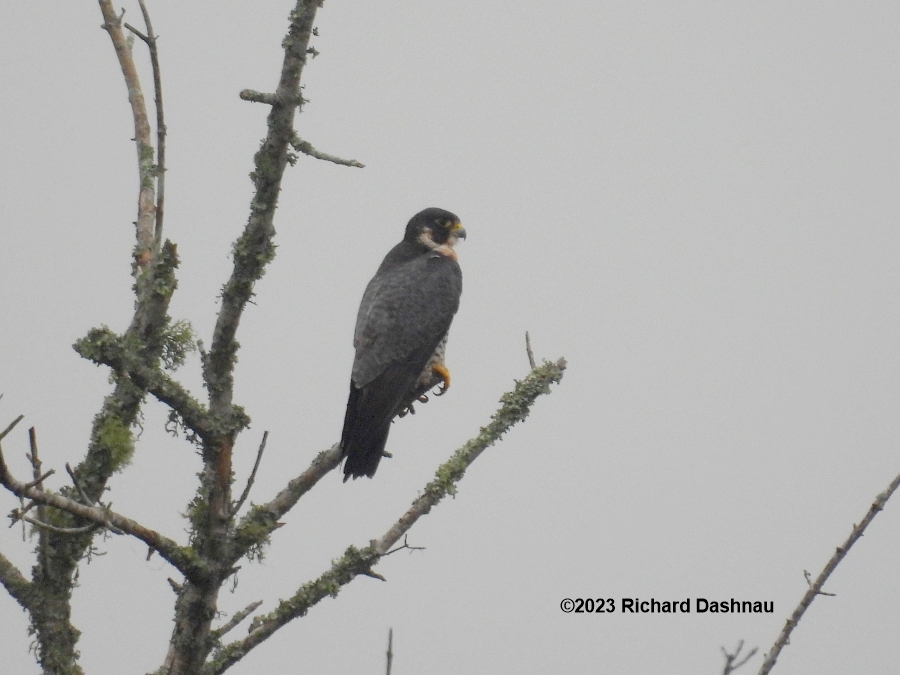
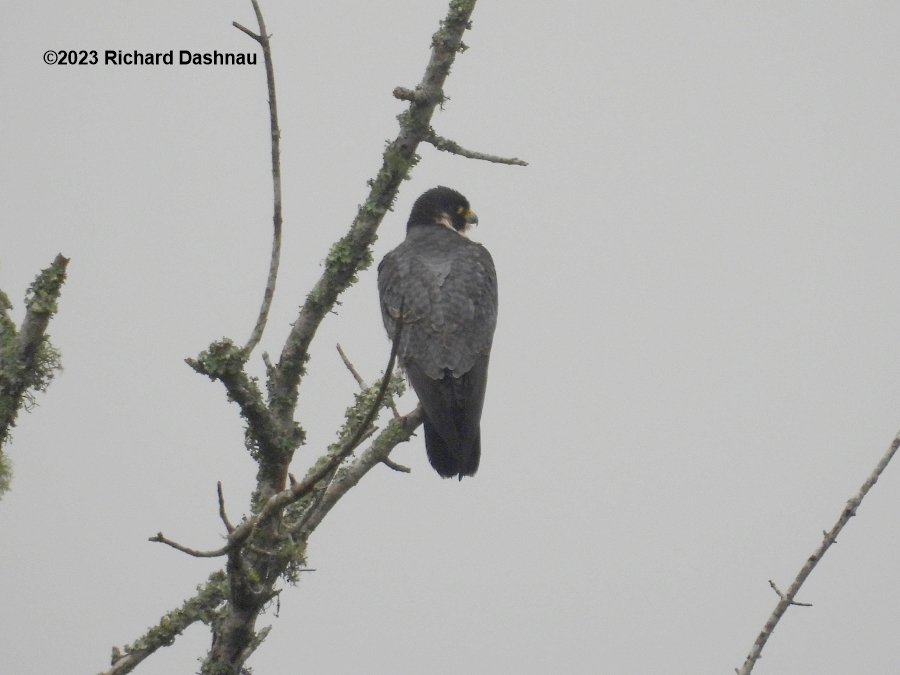
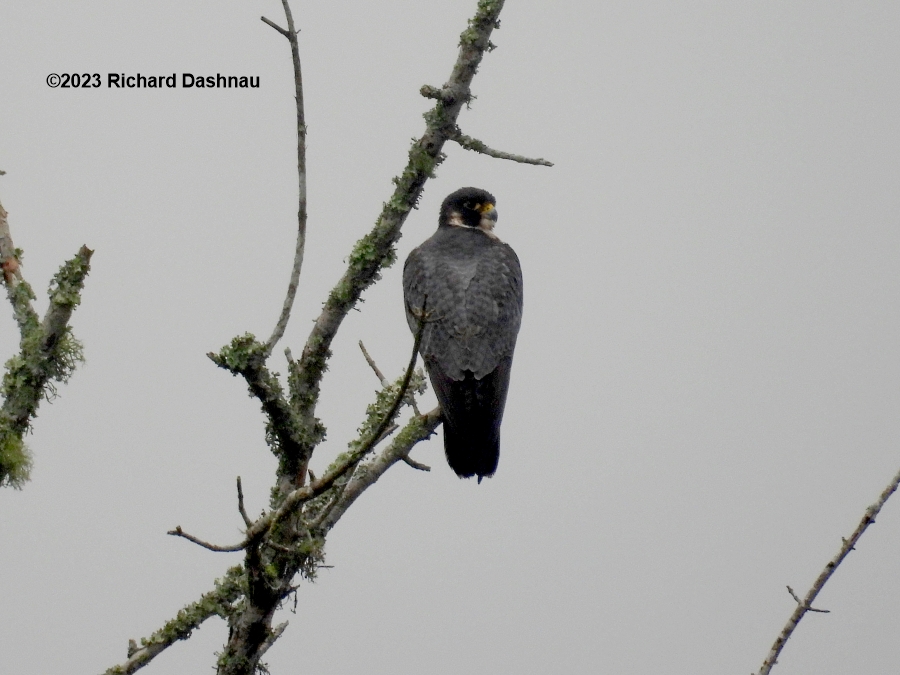
05/06/2021 I
went back to Russ Pitman Park to try to see a female Eastern Screech in
one of the nest boxes there. I was lucky! She was in the box,
with her head
filling the hole. Her mate, the male, was in the same tree
as before. So, here they are.
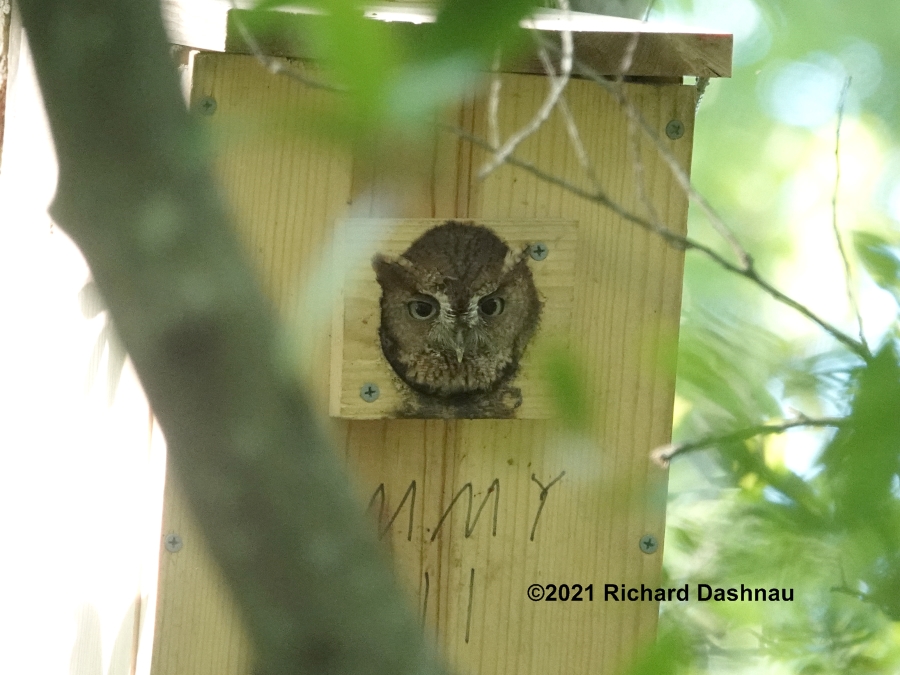
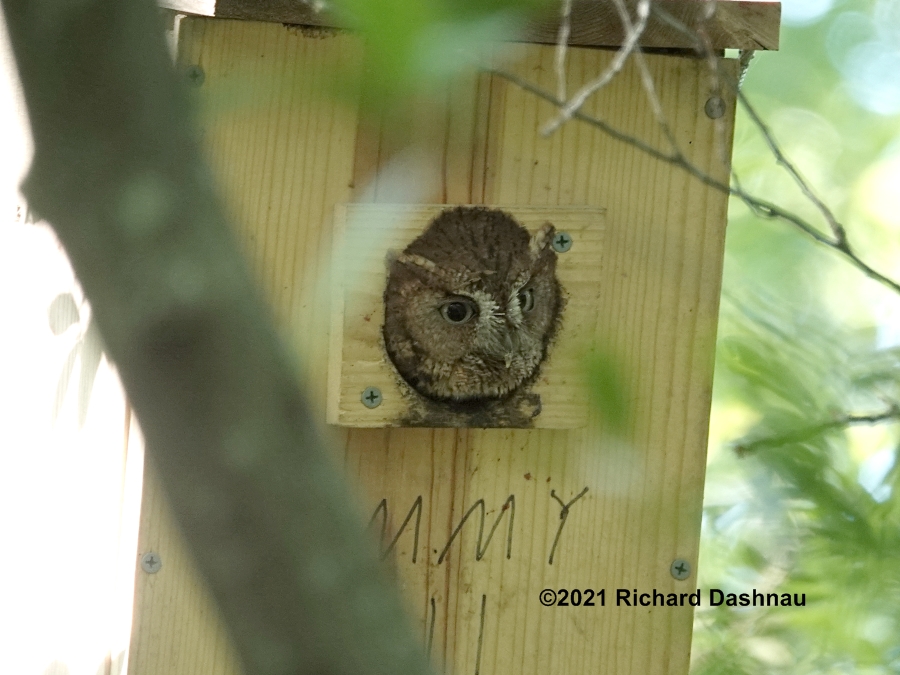
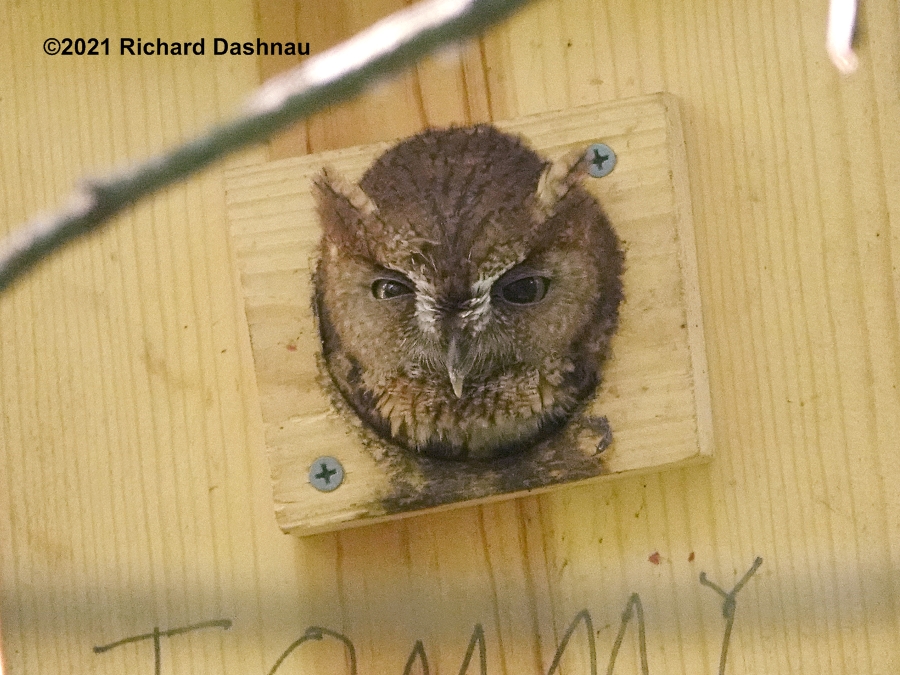
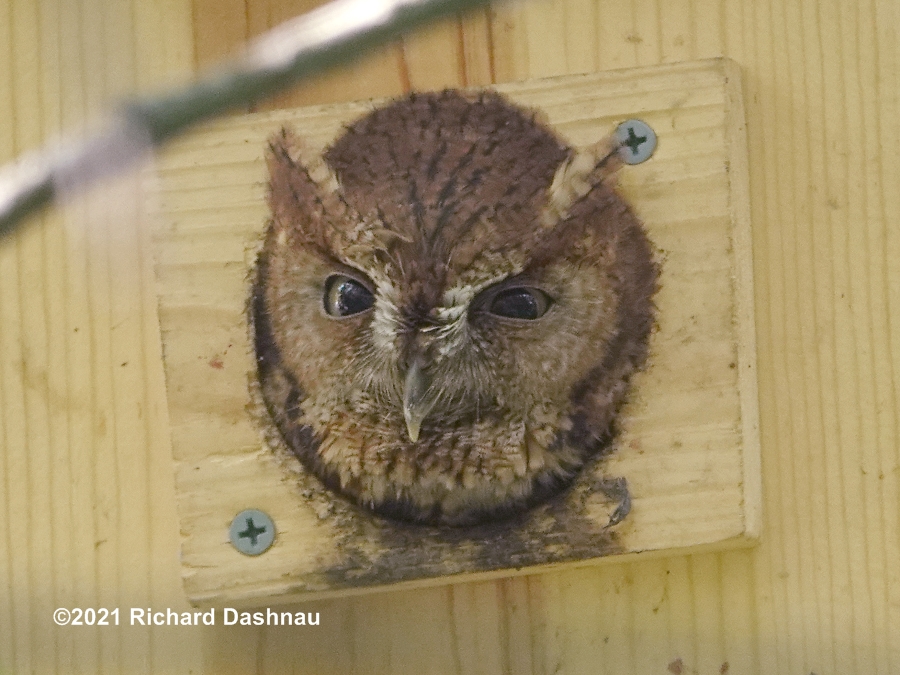
Female Eastern Screech in the box.
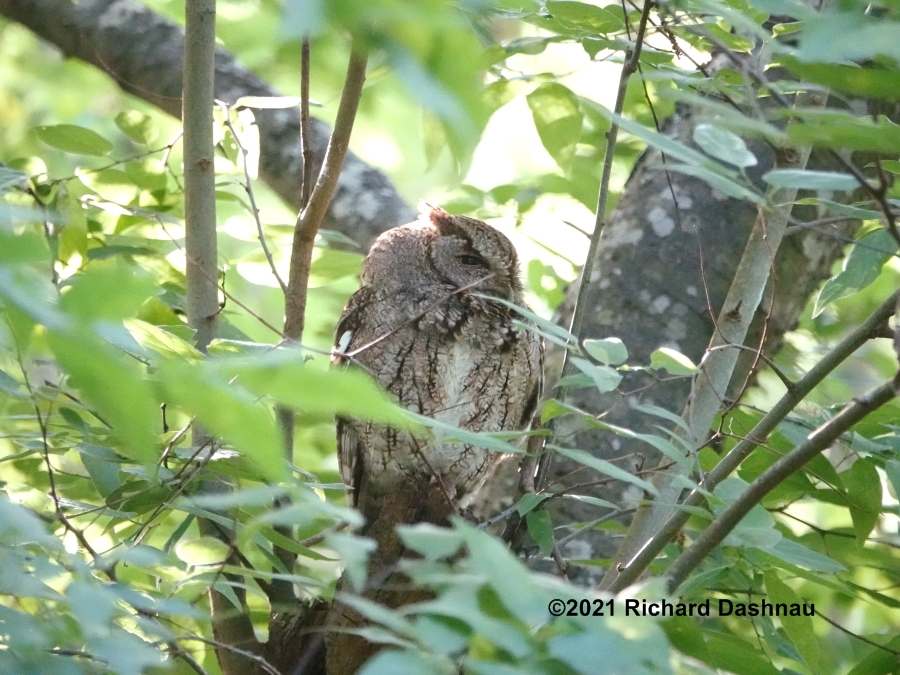
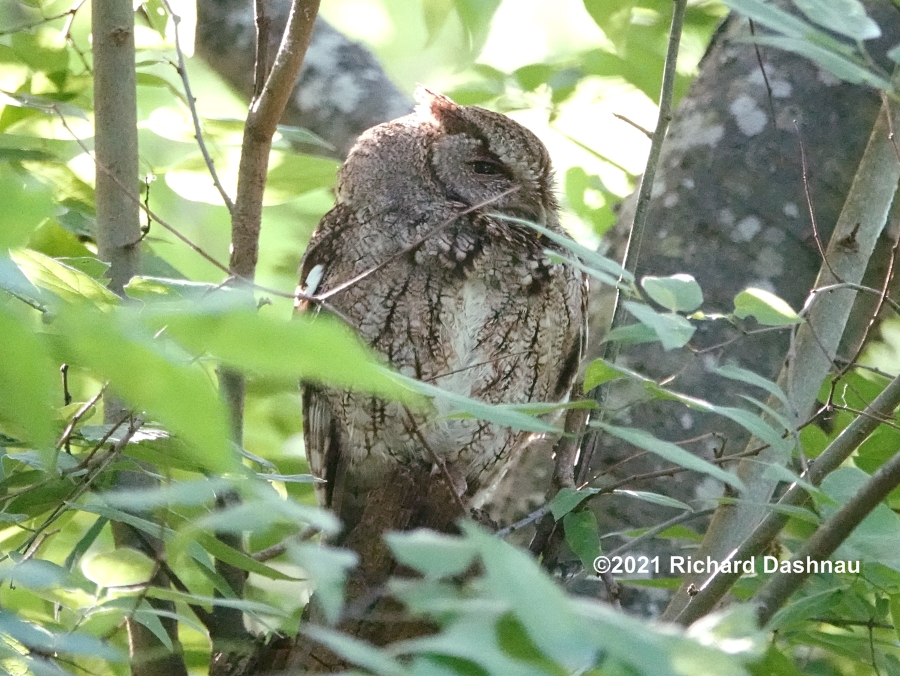
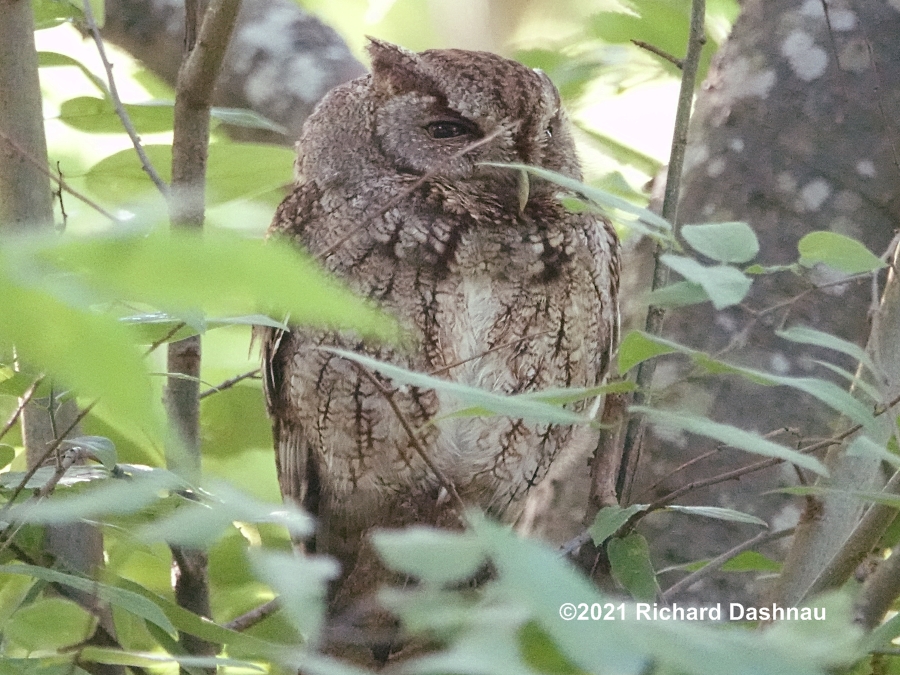
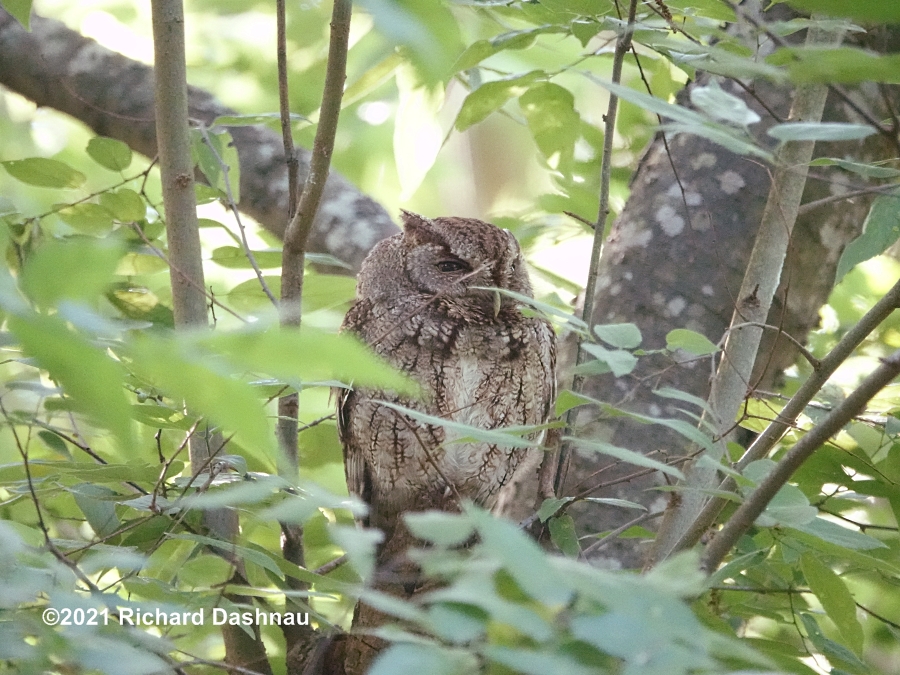
Male Eastern Screech a tree near the box.
04/20/2021 I've
noticed that there are no lizards in my neighborhood. I have been
looking for them since we had that hard freeze event. I
expected
to see them at least
with the return of the warmer Spring weather. But...I haven't
seen ANY.
Many of the plants in my neighborhood were killed by the
cold. Walls that had been covered by
creepers
and ivy are bare now. I believe that if the cold reached in
deeply enough to kill all that cover, then the lizards hiding in it
have also died. Some of the entries
on my
lizard page
show many images of anoles (mostly Brown Anoles) that I saw here.
Now, I don't see any while I'm walking my dog, or at any
other
time.
Today, I went to Russ Pitman Park to see if I could
find any Anoles there (I've seen Anoles there before, and pictures of
those also appear on my lizard page .) Russ
Pitman park
is
a very small (4 acres) park in Bellaire, Texas.
I
was
happy to find the lizards, but there were other things going on there,
too. While talking to other visitors there, I discovered that
there
were at least two nesting pairs of Eastern Screech Owls (Otus asio) in
the park, too! If not for some of those visitors, I might
not
have seen any, but they pointed out this one, which they said was a
male, and which was guarding its mate that was inside the
nearby nesting box. Here he is, sleeping and hiding in plain
sight--about 8 feet up.
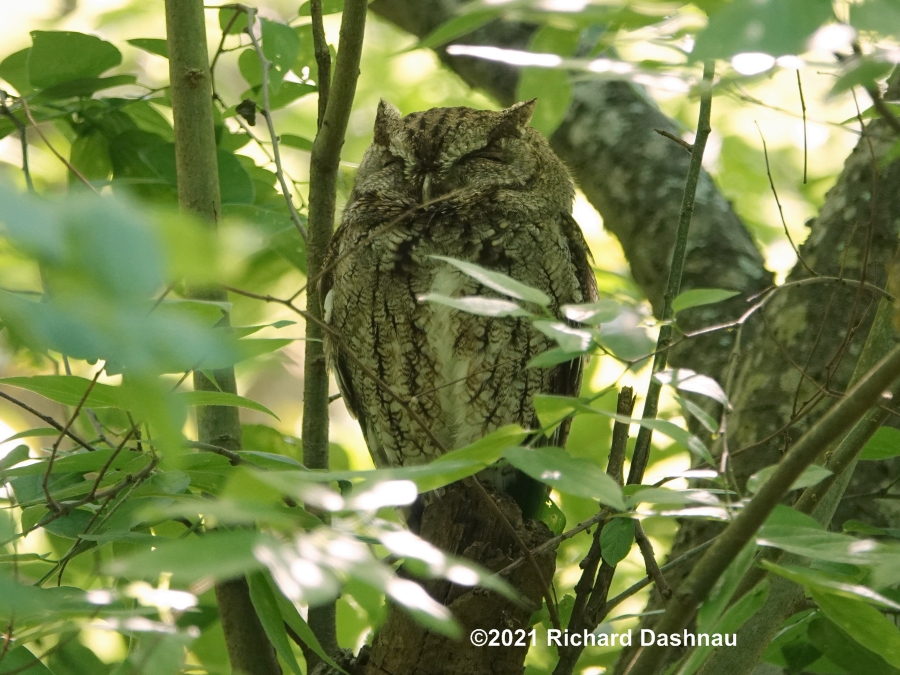
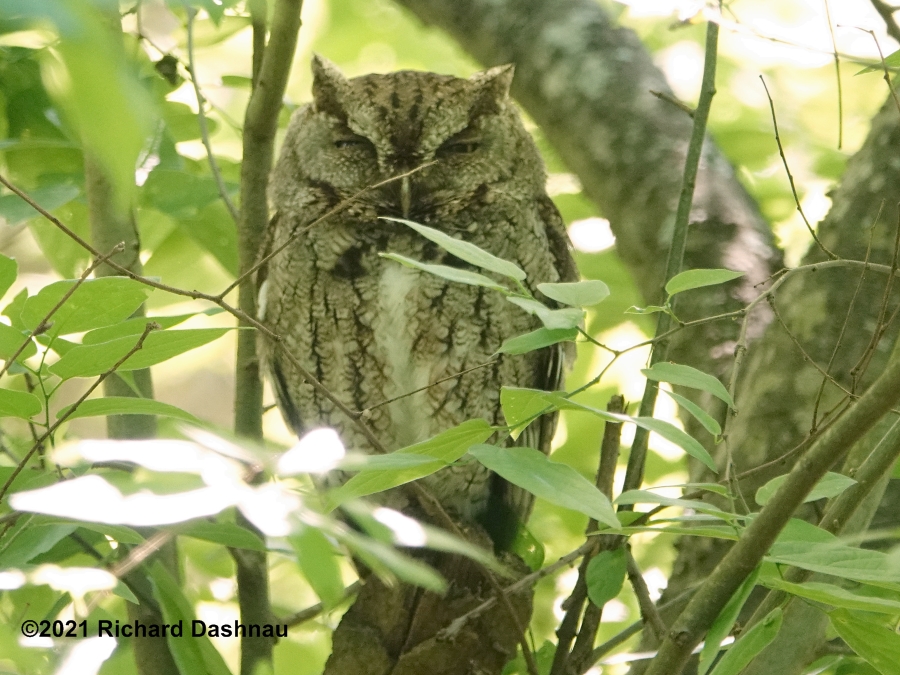
03/15/2020
This day was the last day for
me to visit Brazos Bend State Park for a while. With the warnings about the
coming pandemic, and travel and social distancing protocols
being
put into effect, I had decided not to go to the park. Over
the
weeks that followed, protocols put into effect by the BBSP,
and
the state took the decision out of my hands anyway.
So...BABY OWLS AGAIN!! Back to the
Owls and their nest a week later.
The owlets have grown a lot! One of the parents was visible
in
another tree. It's possible that the other one was around,
but no one
saw it. I
spent some time in the morning near them, and then a couple hours in
the afternoon. Here are some pictures from the afternoon. The parent
(don't know which one) rested in
a nearby tree (1)
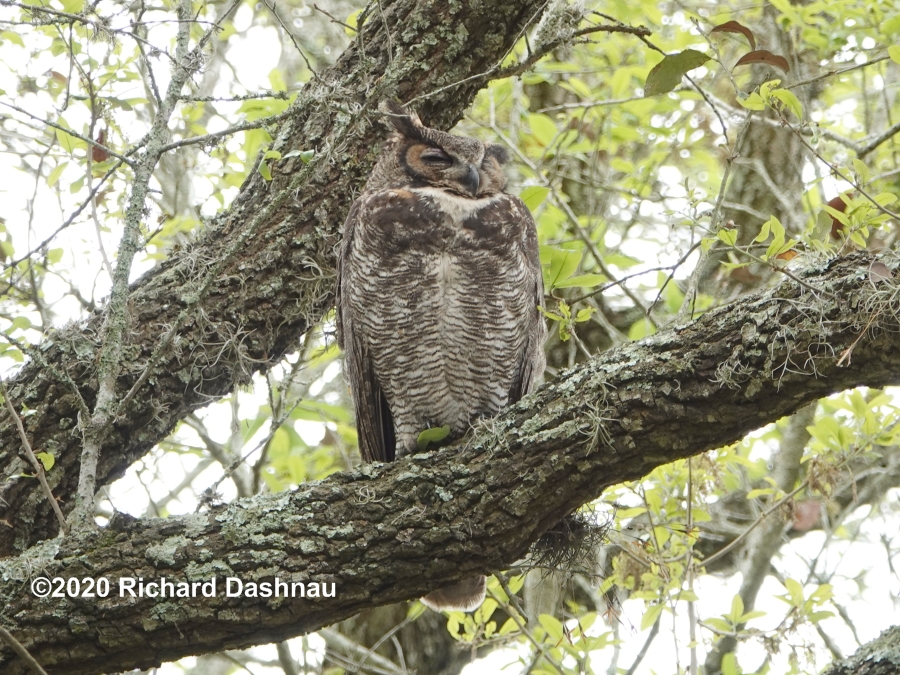
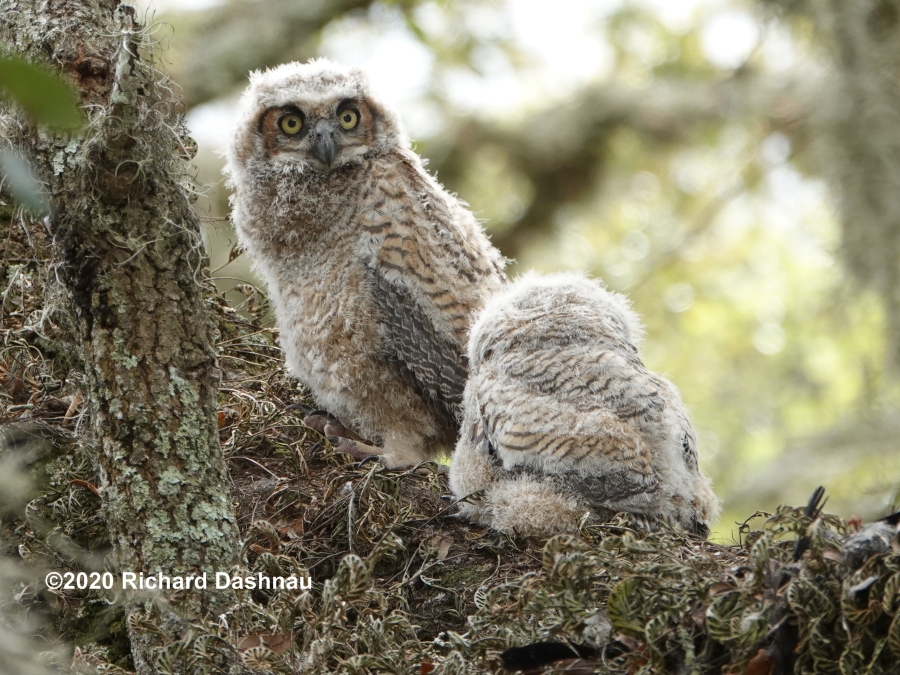
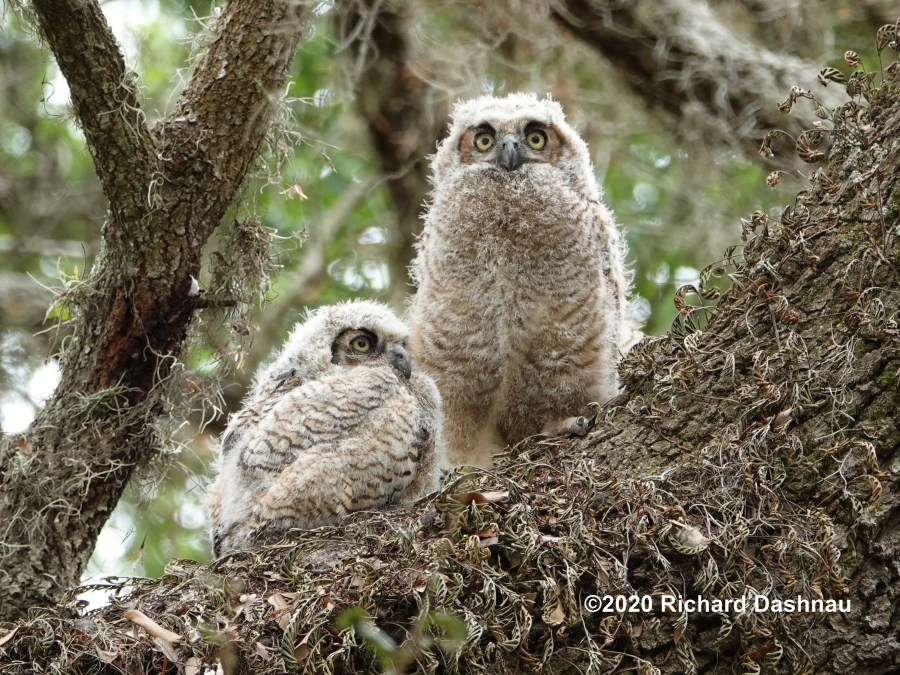
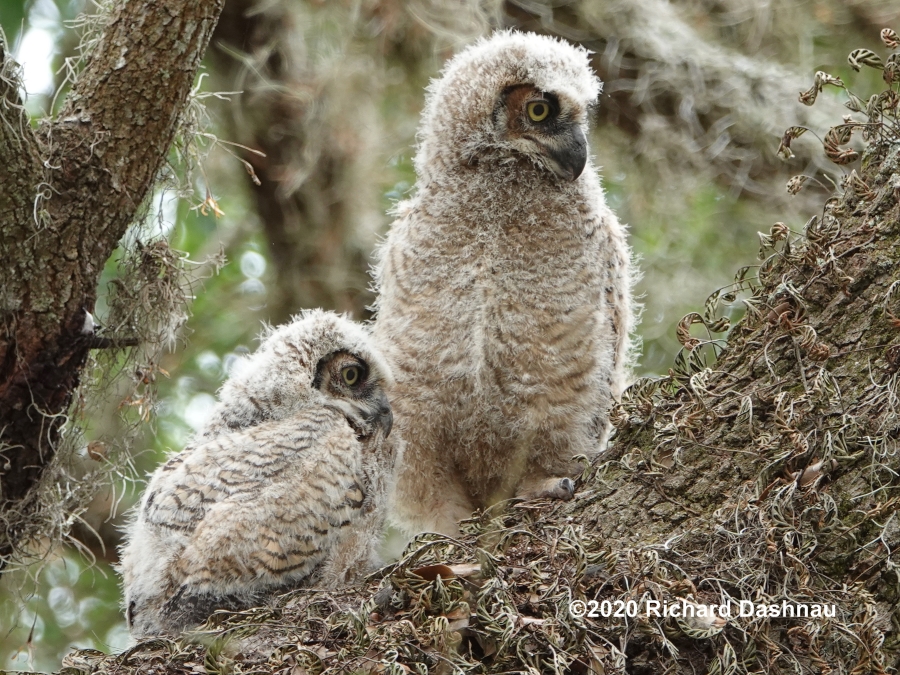
01
03
04
05
The
owlets didn't seem be distressed by the visitors coming by to look at
them. The owlets were on a branch about 20 feet off the ground.
Sometimes, however,
something or someone seemed to
catch one or both of the owlets'
attention, and then they'd turn those huge eyes towards it.
(03 -
09). Finally, first one owlet lay down...and then the other did, and
they
went to sleep. (10) I
have a short video (4:30 ) that I put together from short
clips that I shot during this time between 1 pm and 3 pm.
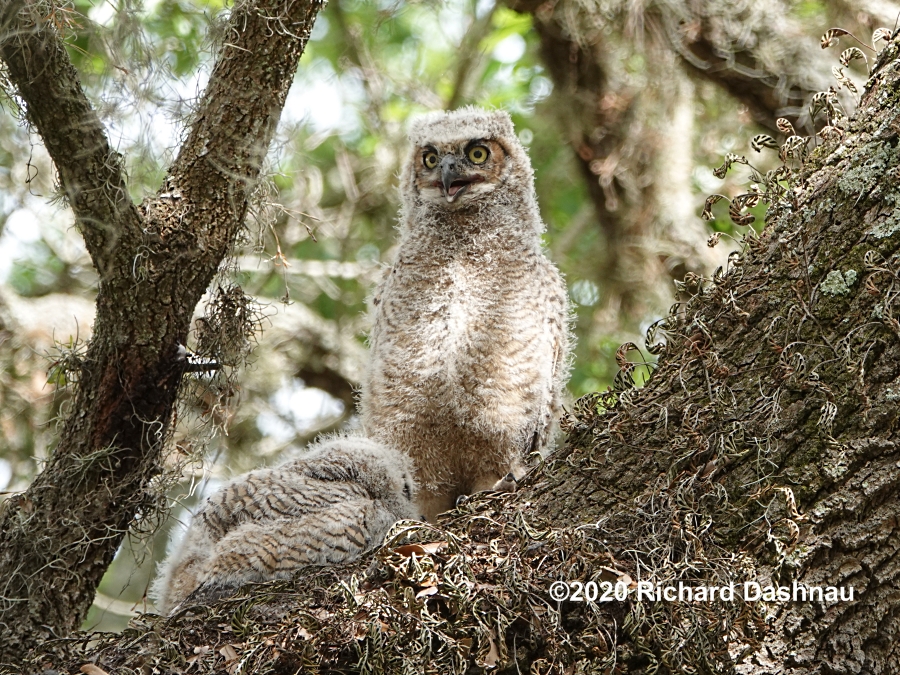
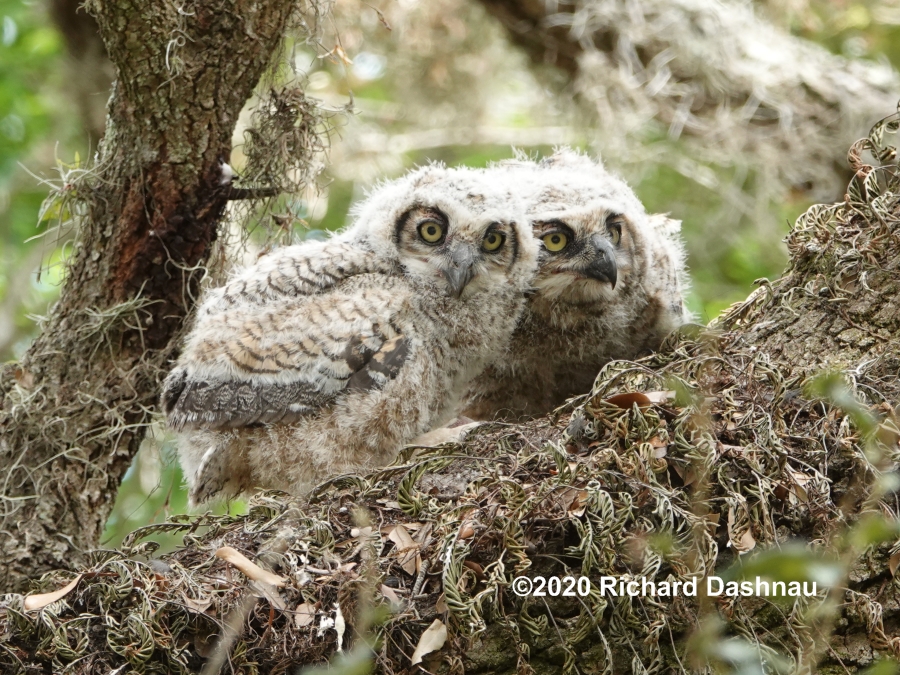
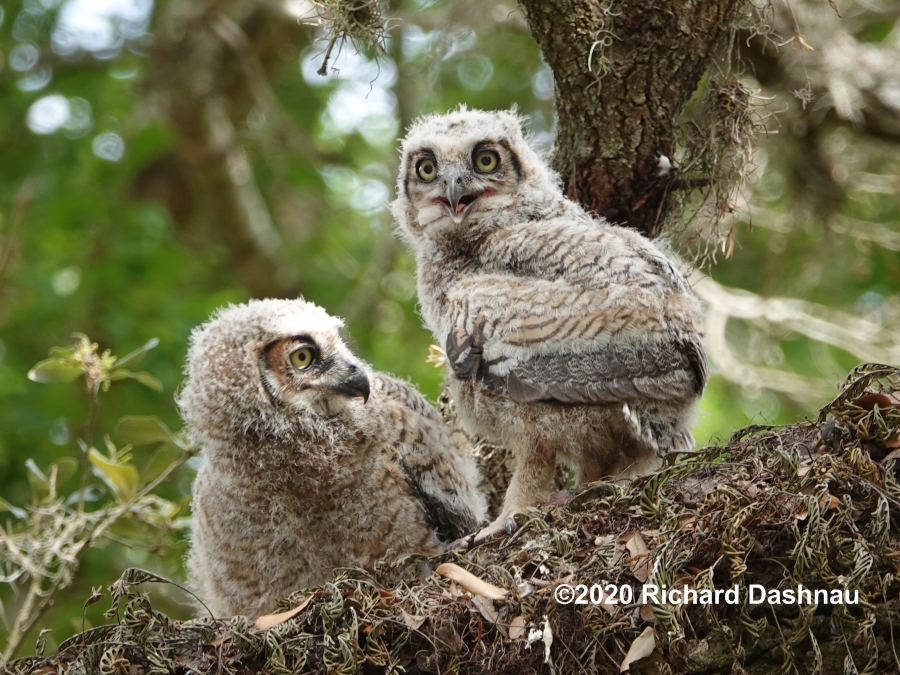
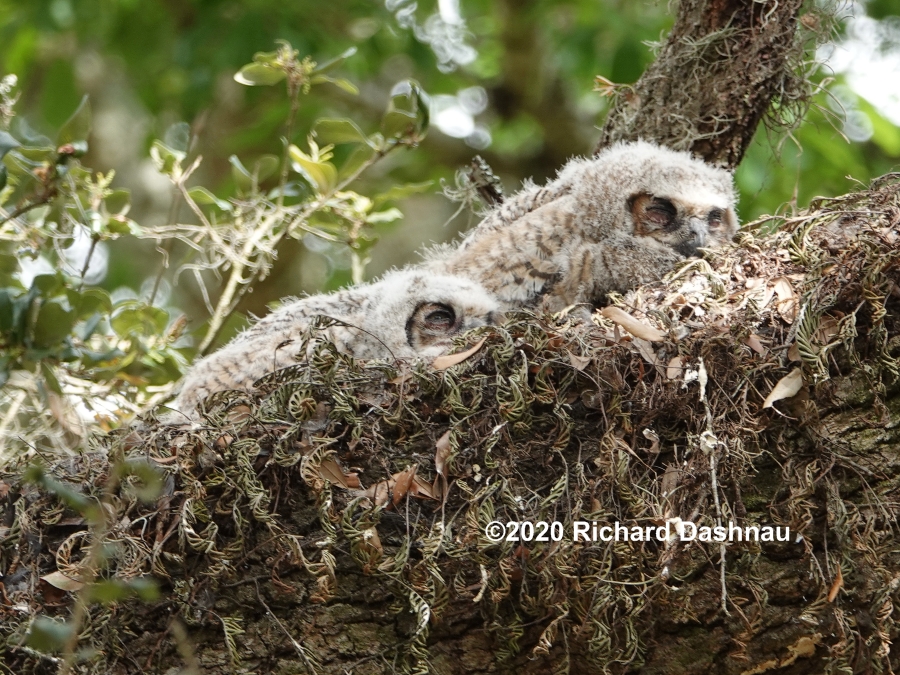
06
08
09
10
03/08/2020
BABY OWLS!! Great Horned Owls have nested in Brazos Bend
State Park again. They may nest in the park every
year, but people may not always find where the nest is. There have
been
a few years that I heard about a nest, but didn't go investigate. But,
this morning, I decided to go visit. I didn't stay long because many
othere people were there with cameras, and I didn't want
to add to the
crowd. So, here a some pictures. I have no idea how old the owlets are,
but I'm sure
at least some of the birders do. One of the
parents was resting in one tree (01,02), while the nest with owlets was
in another.
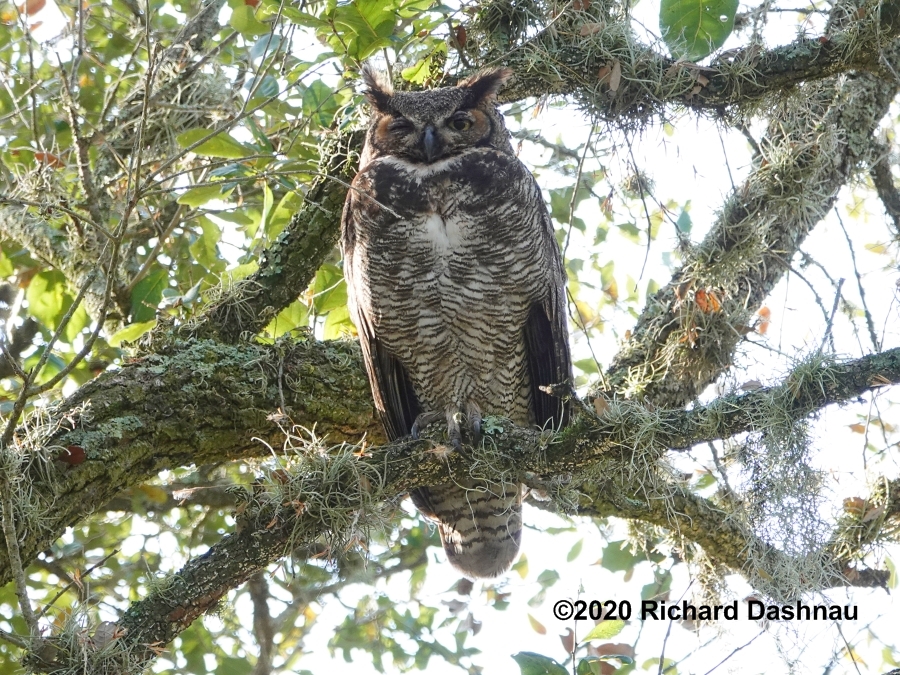
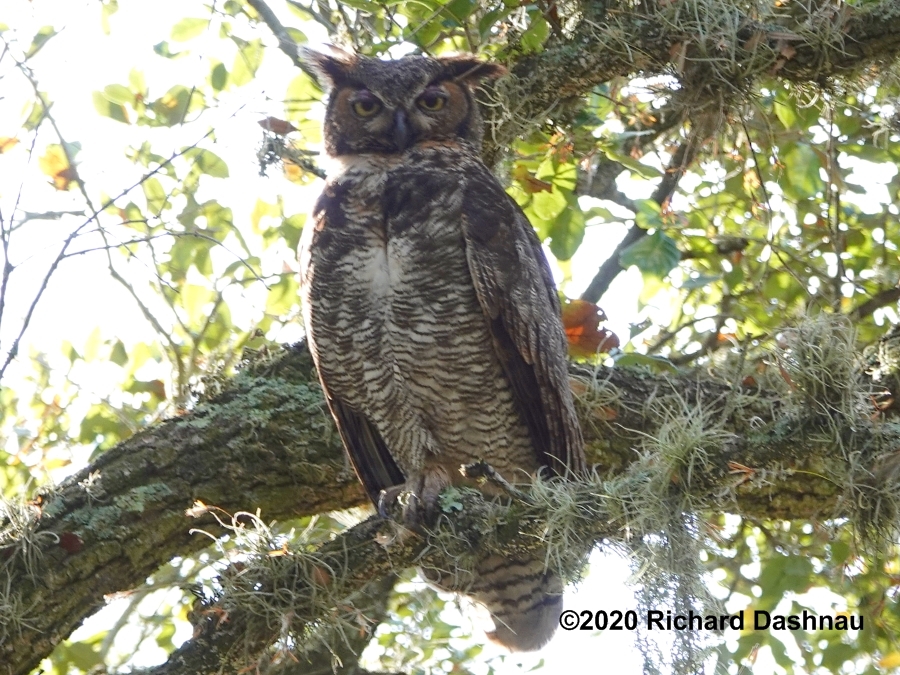
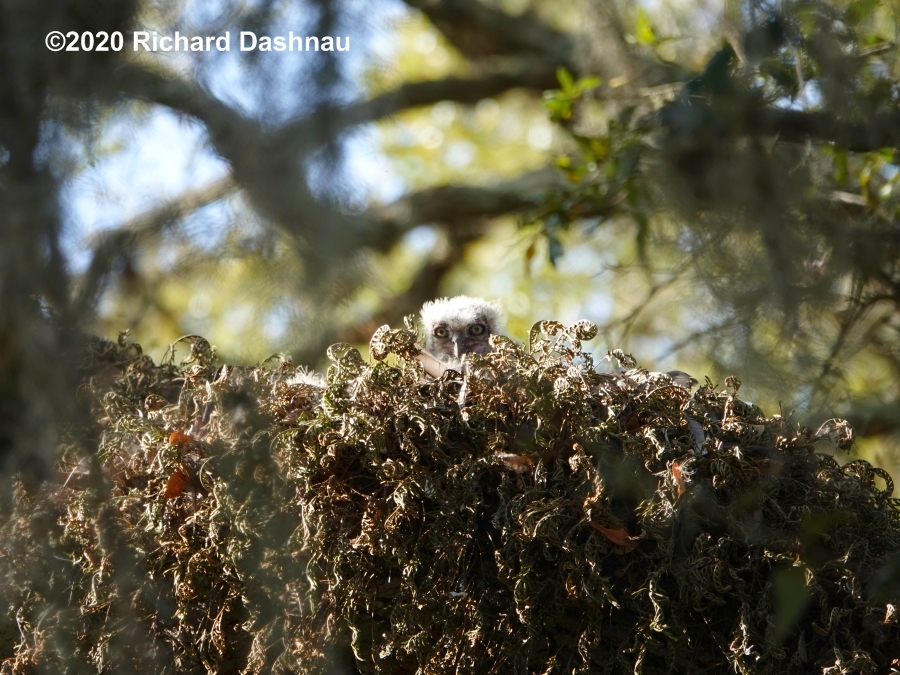
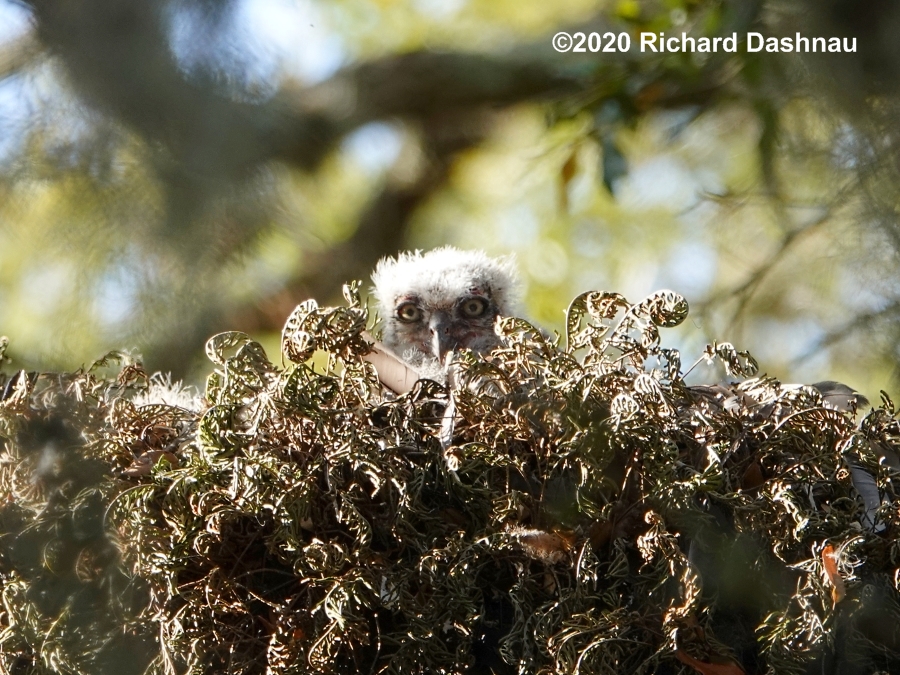
01
02
03
04
The
relatively tiny owlet looked out over the edge of its nest; and the
nest was camouflaged by a veneer of Resurrection Ferns. I
walked
around the tree and was able to see another
owlet peeking over the other side. (03 - 08)
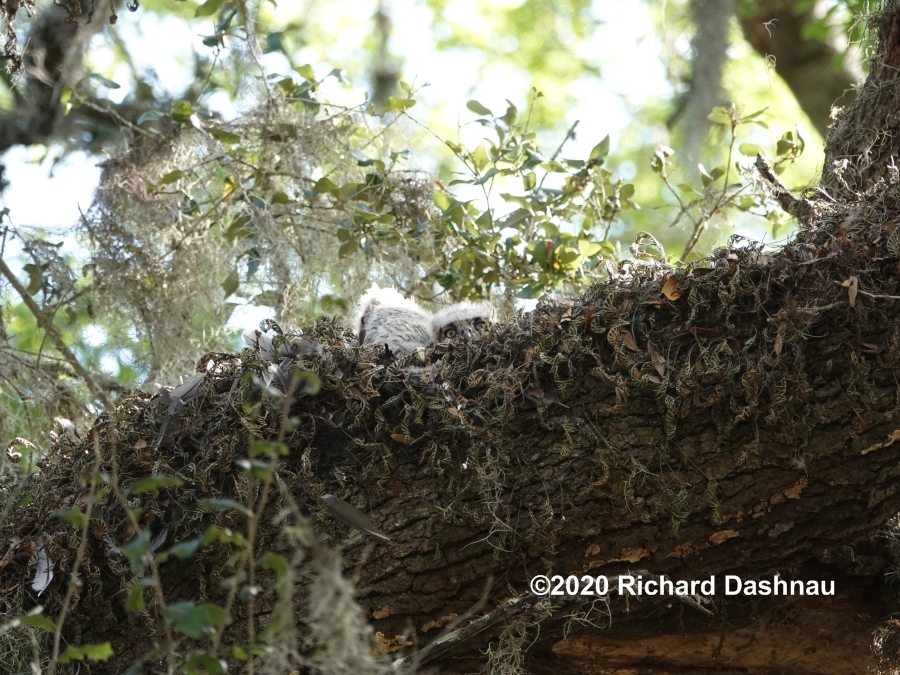
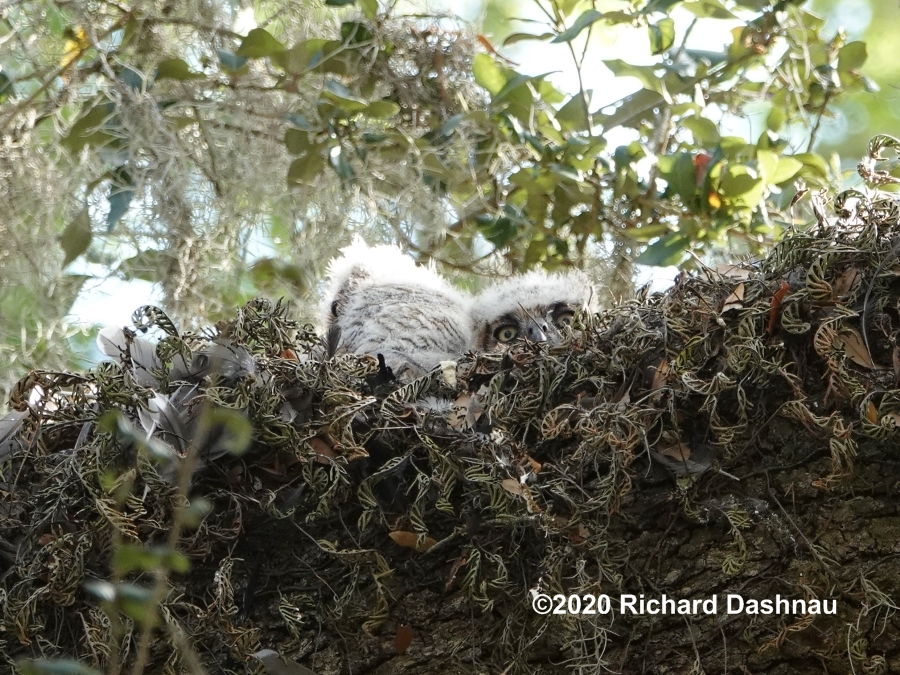
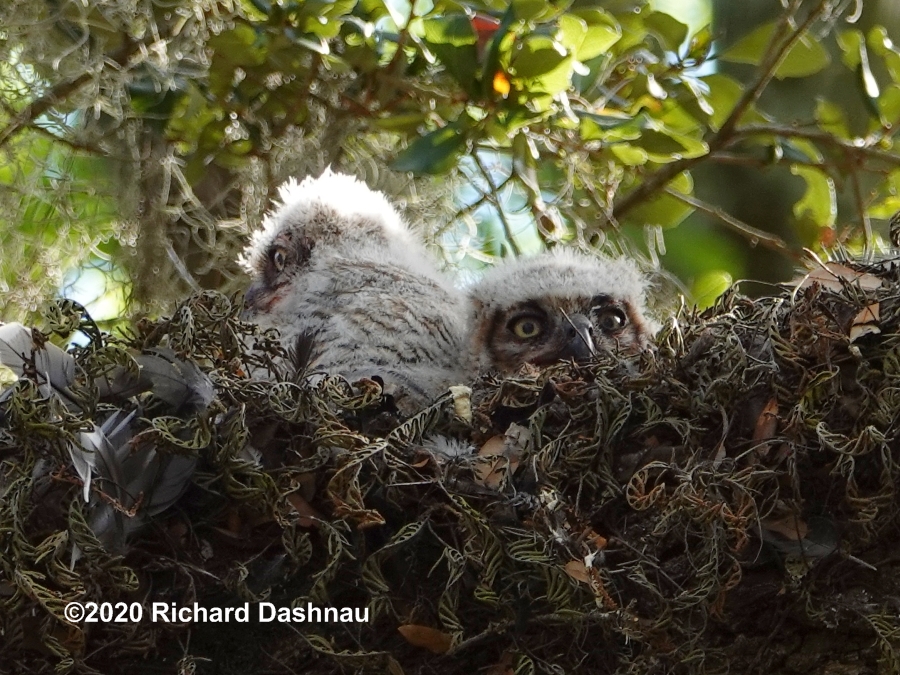
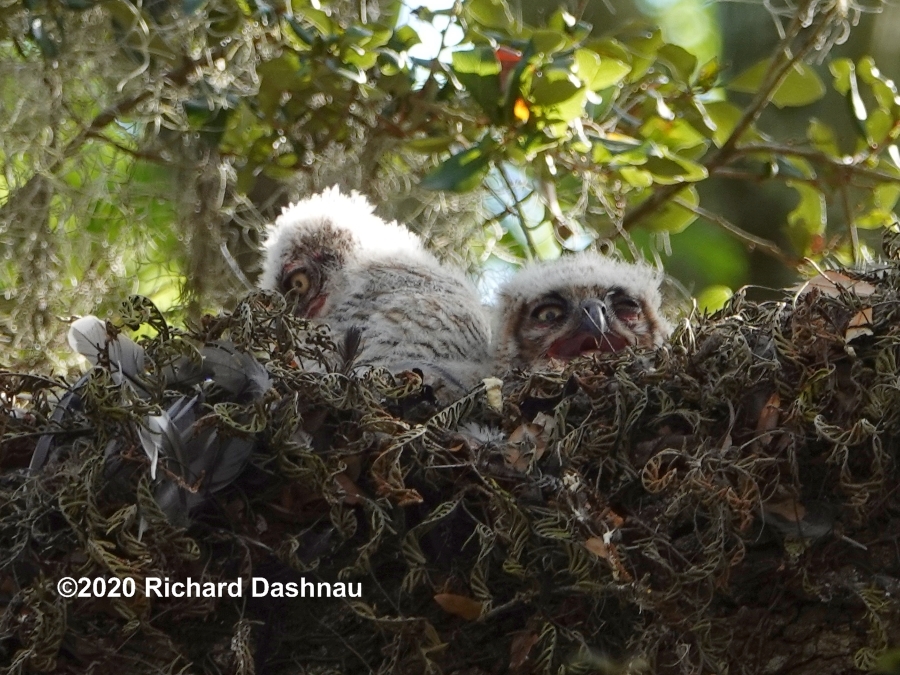
05
06
07
08
04/16/2017
Easter
Sunday is usually busy at Brazos Bend State Park. So, I usually bring
my bicycle to allow me to cover more of the trails. Today I rode about
16 miles,
repeating loops over the Elm Lake, Spillway, Pilant
Slough, Live Oak, and 40 Acre Lake trails. I was riding West on the
Spillway Trail when a couple of park visitors called my
attention
to a Barred Owl in a tree above the trail. There was an adult in one
tree, and there was a juvenile owl in another tree. I stopped and
watched for a while. The visitors
told me that the adult had had a
crawfish and they thought it would try to feed the young owl. I didn't
see the crawfish, and just got one picture of the adult. The young owl
hopped
from branch to branch, and then took a short, risky flight to another
tree (I caught this with video). The adult flew off, and the young
owl-apparently exhausted-laid
forward and rested on the branch.
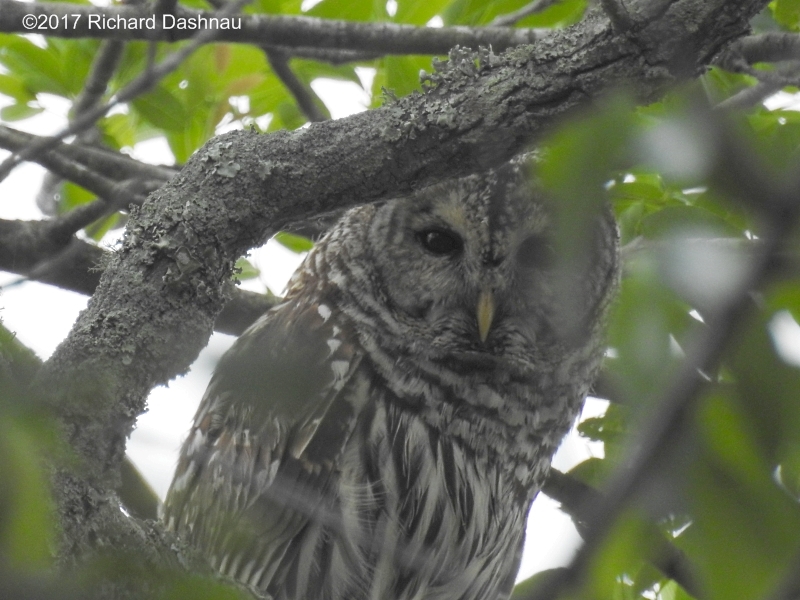
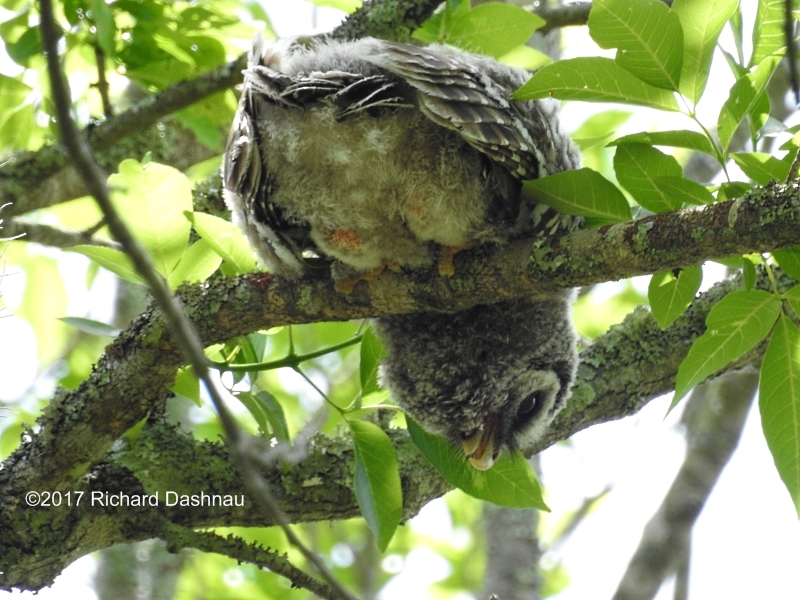
I
returned about an hour later, and the young owl was still where I'd
left it. But,tt stood up, and began grooming itself, then stood still.
I rode on, and didn't see it again. This video shows the
owl's short
flight, and then grooming itself an hour later. It appears to be
removing the fluffy downy coverning to uncover the feathers underneath.
According to the Audubon website
(http://www.audubon.org/field-guide/bird/barred-owl ) young Barred Owls
take their first flight at about 6 weeks old.
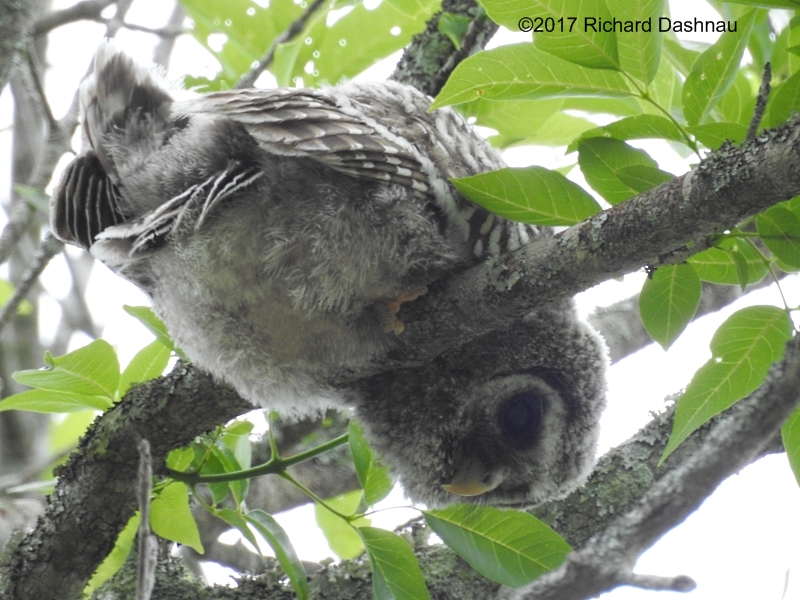
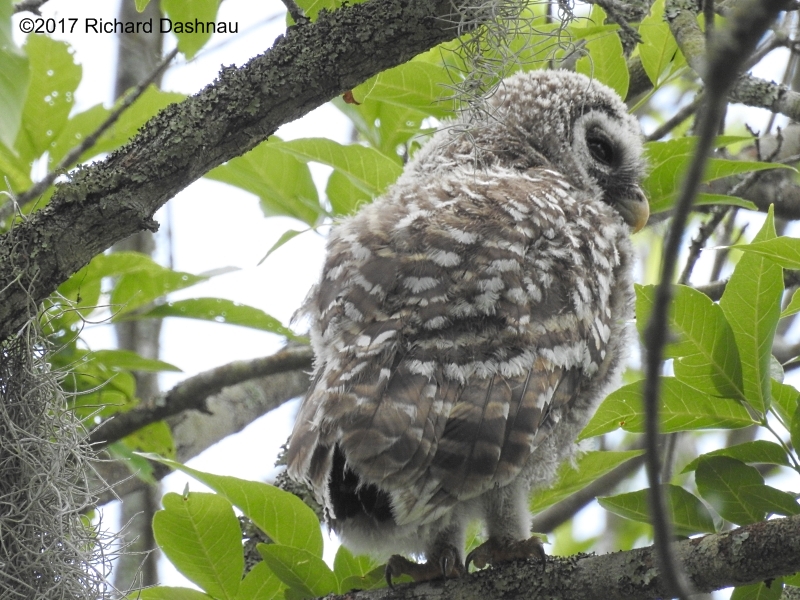
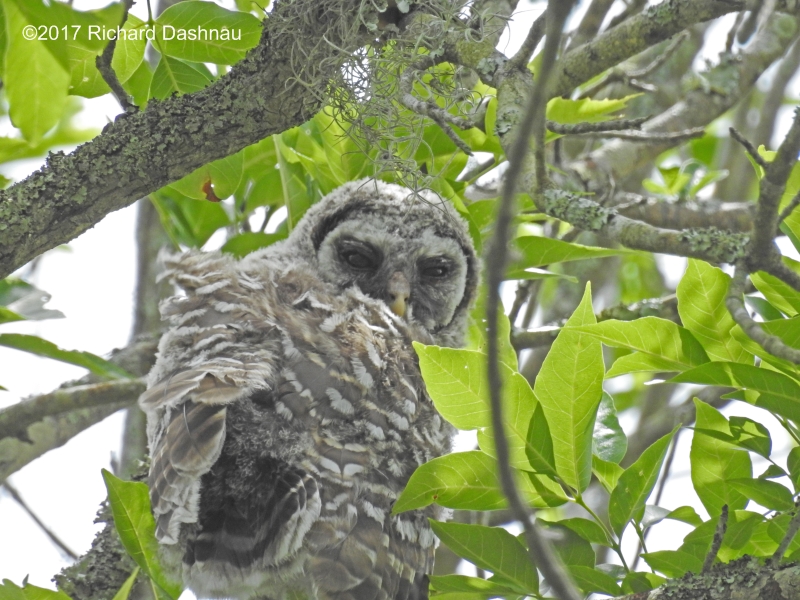
March 29, 2015--
The Great Horned Owl had been in the nest (which it had taken from a
family of Hawks) for some weeks, but the Owlet was first seen March
7th. Today I got my *best* view
of the 3-week-old baby. What a fuzzy
critter! It almost looks like a little-beaked bird is peeking out of a
white, furry sack. I've heard some people refer to the chick as an
"owlet". Why isn't this
pronounced "ow-LAY"--to rhyme with
chalet, fillet, or valet? Maybe some day it will be. According to the
Audubon Field Guide website (http://www.audubon.org/field-guide), young
Great Horned
owls may learn to fly at 9-10 weeks old.
As cute as the young one
seems to be, the adult Owl showed it's predatory nature. I'd heard that
it had carried prey up to the nesting site, but I didn't think it would
still have it by the time I got back.
But, when I arrived, the Owl was
still working at its catch. I quickly shot some pictures and a short
video clip before the Owl finished. I decided to hurry and set up my
tripod and spotting scope to
share the sight with the park visitors who
were nearby--so I didn't get much video. The images here are still
photos, and a few frame grabs from the very shaky video.
Still, even
the short bit I
caught was a interesting. There have been some
observations by some of the folks with big lenses regarding either
parasites (mites?) and/or redness on the eyelids. I could even see it
on a
few frames of the video clip. Has anyone made a determination on
this condition? The adult didn't seem to be impaired during the brief
time that I watched it.
Here's a clip that I made from the original video. I've slowed it down
about 7 times. Click the link to see it--Owl
03292015.wmv
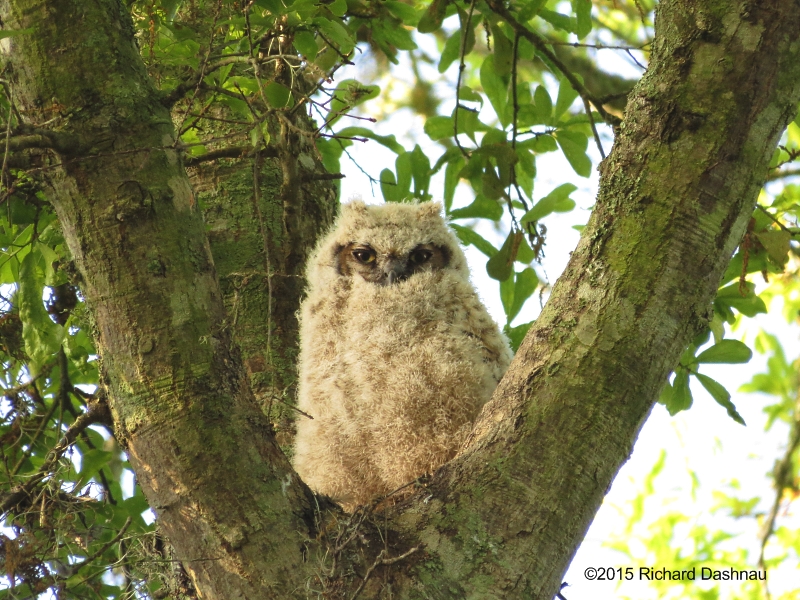
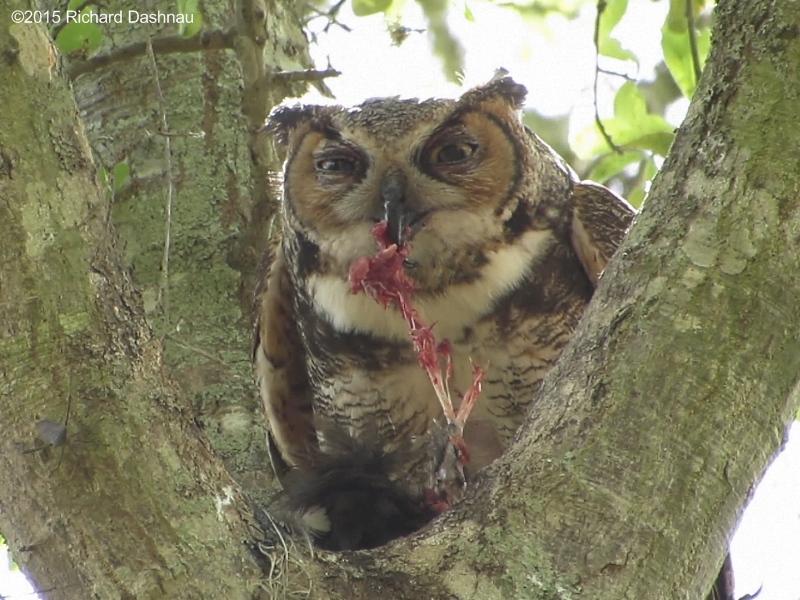
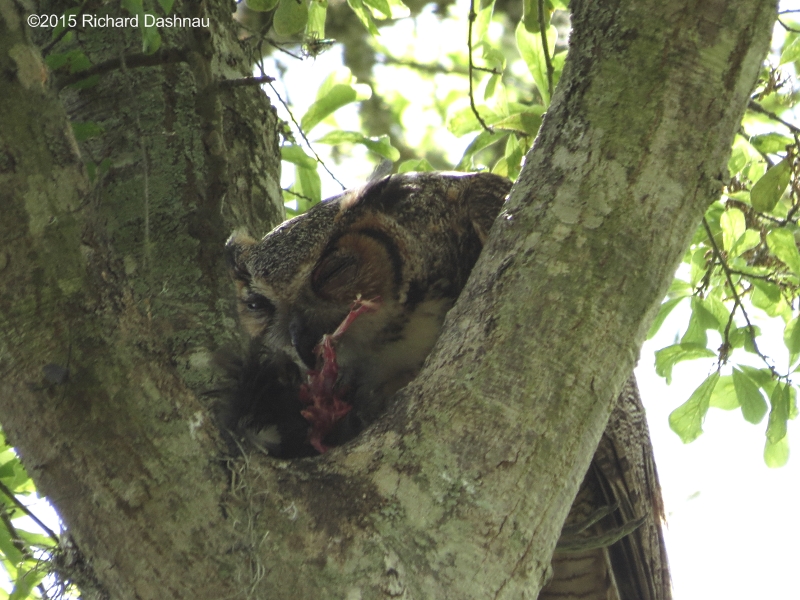
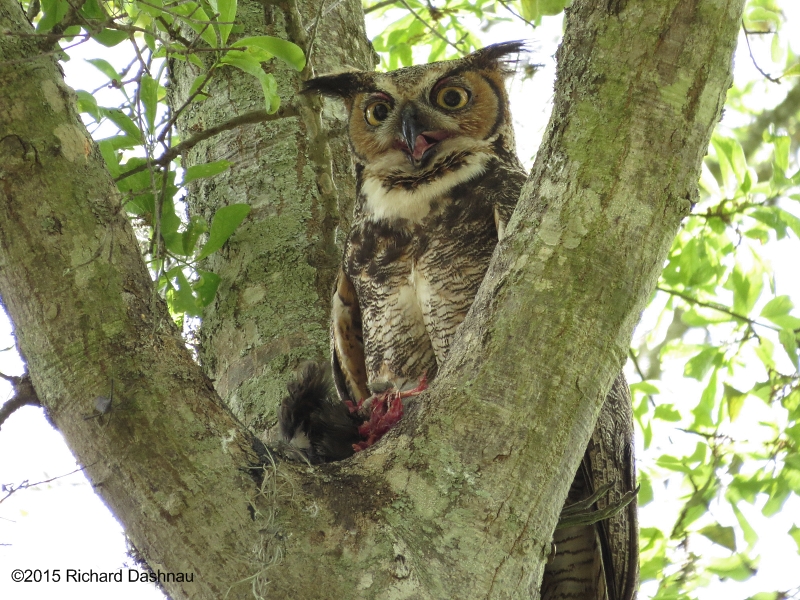
BABY
OWL--OR OWLET
PULLING
THE MEAT OFF THE BONE
GRABBING
ANOTHER BEAKFUL
WIDE-EYED LOOK
The Common Gallinule, or
Moorhen, or Gallinula chloropus--according to my Sibley Guide to Birds
1st Edition--has "long greenish legs" and long, bare toes. The Purple
Gallinule, Porphyrio
martinica, (which probably aren't here yet) have
similar toes, but "bright yellow" legs. And the American Coot, Fulica
americana, has lobed toes. Since the feathers appear to be
black,
and the
legs green with long toes, I think the carcass was a Moorhen.
I've attached a picture of each of these three for comparison with the
feathers and the cropped close view of the foot.
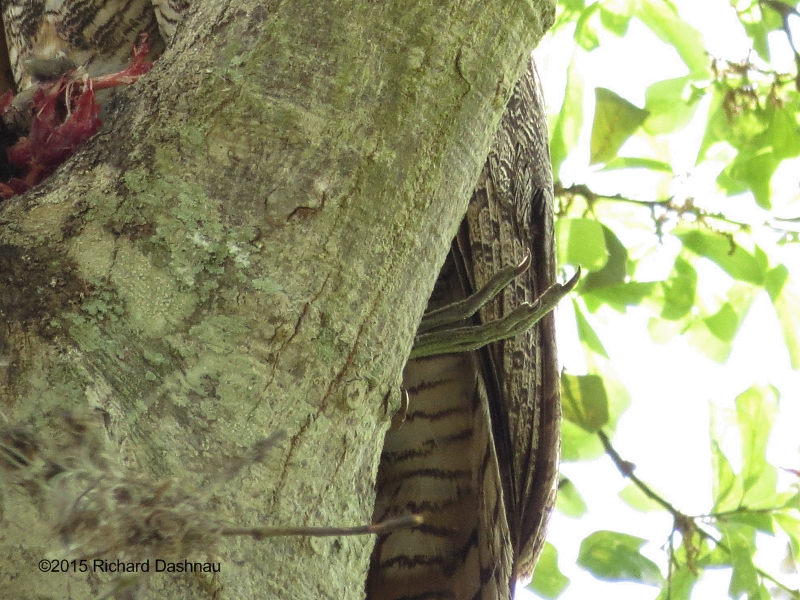
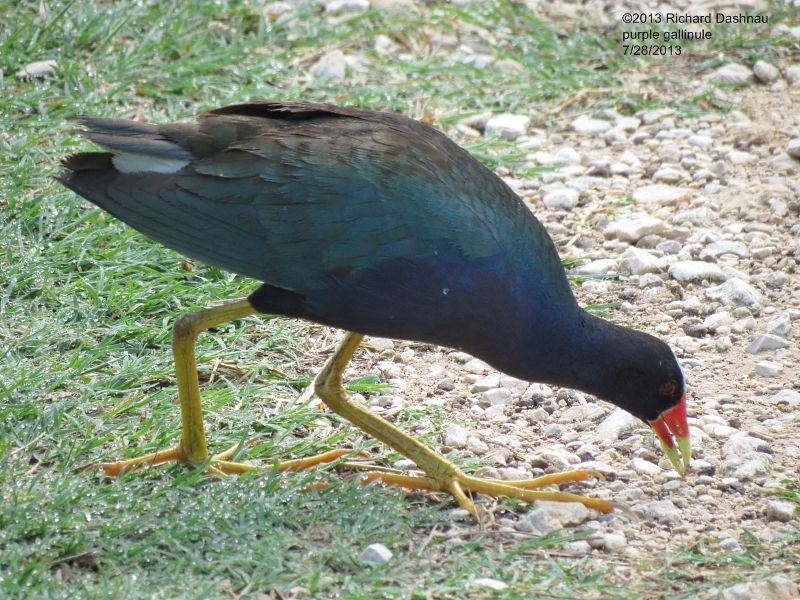
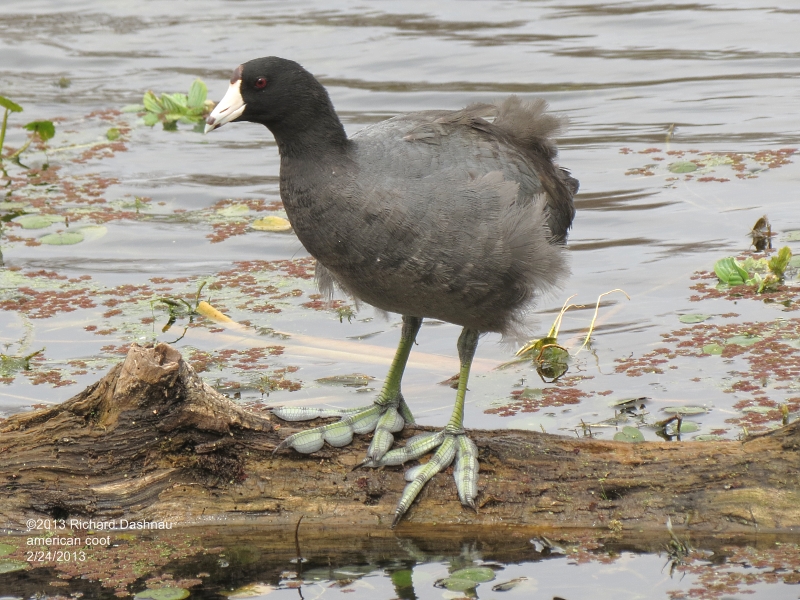
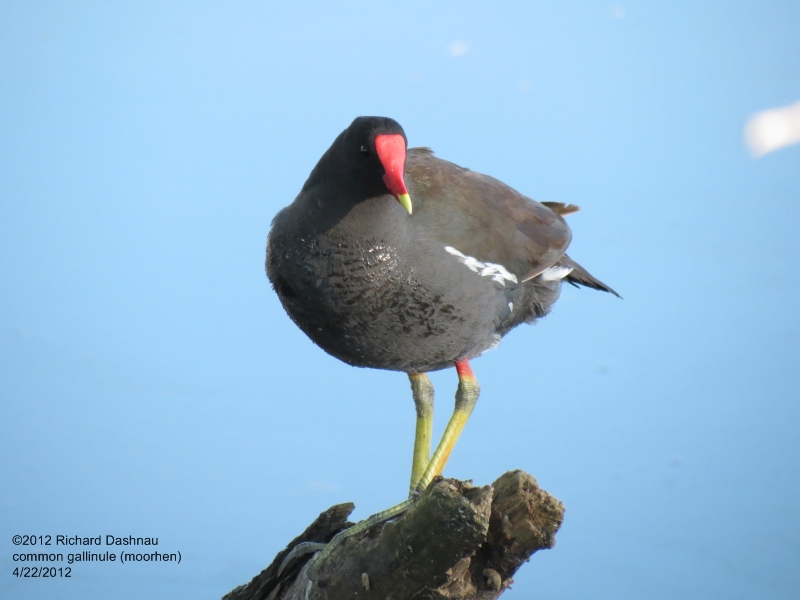
THE
FOOT OF THE FOOD
PURPLE GALLINULE
AMERICAN COOT
COMMON GALLINULE
(MOORHEN)
While all the excitement with the Owls and the visitors
was occurring, one of the park visitors (a first-timer) asked me if I
could hear a woodpecker working. I told him I had, and I had
been
looking around for it. The tapping seemed to be coming from a dead tree
about 15 feet away, and I began searching more intently for the
woodpecker. I slowly walked around the tree, and
judging from what I
heard, I should have been looking right AT the bird. So...the
woodpecker was invisible....or..."It must be making a nest! The
woodpecker must be *inside* the tree!", I told the
visitor. And, just a
few minutes later, the bird was found--working at a hole in the tree. I
shot a quick video of the woodpecker--this appears to be a Downy
Woodpecker, before trying to show
visitors *this* one as well. The
attached four images of the woodpecker show it going into the hole.
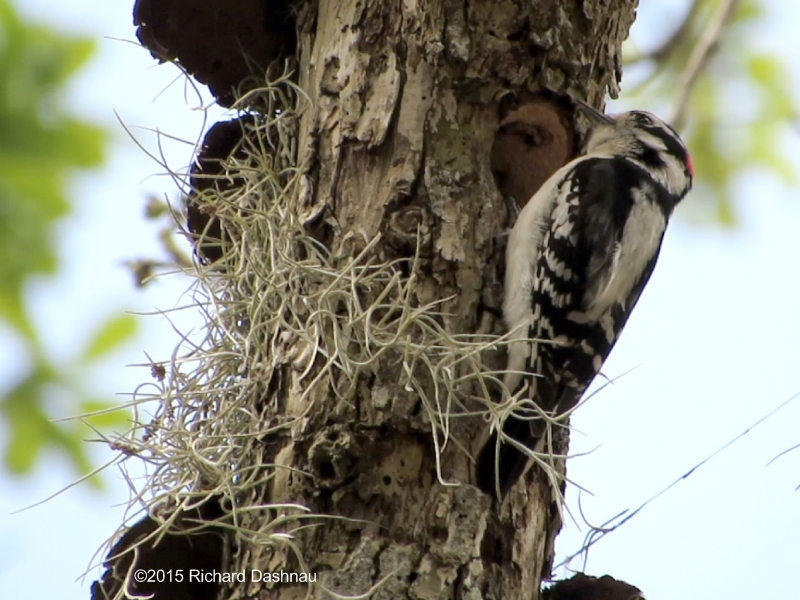
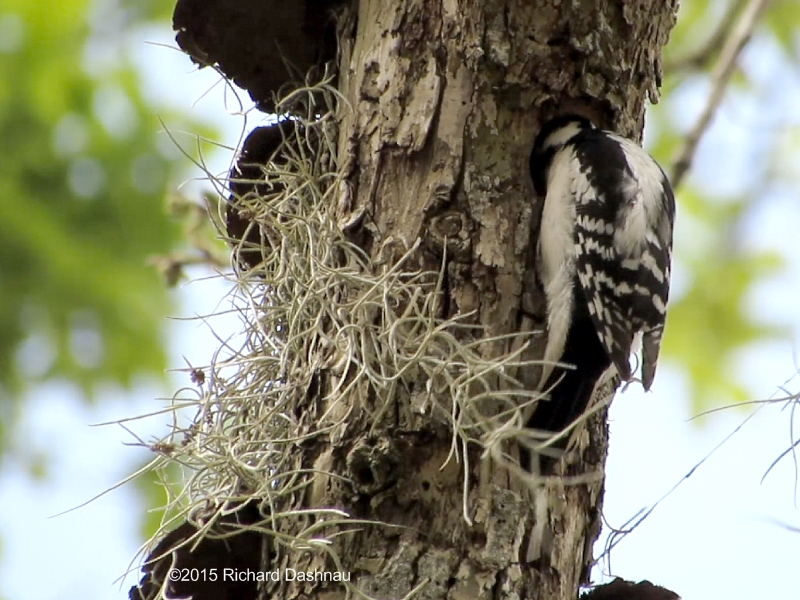
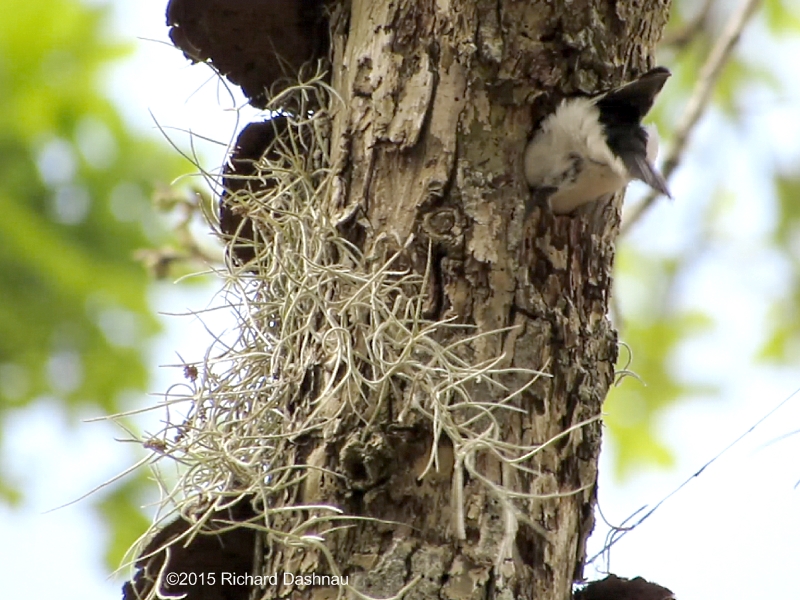
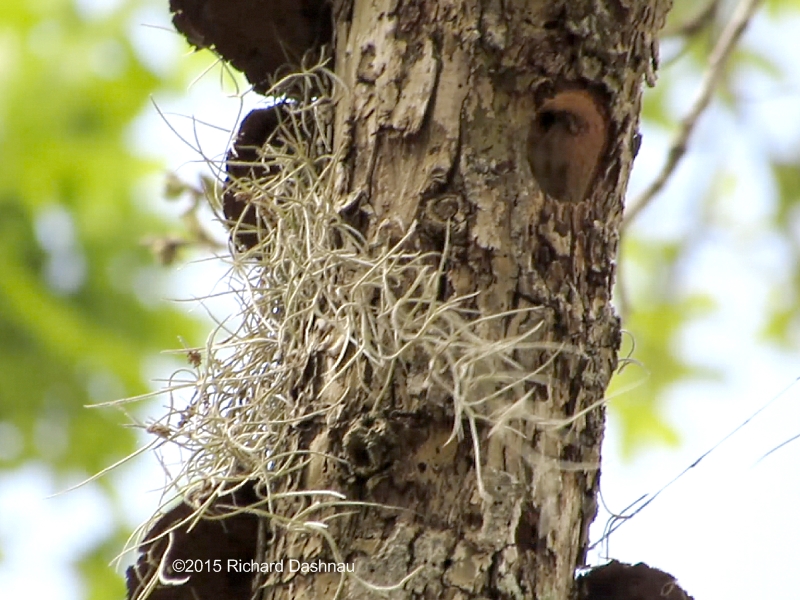
03/27/2006---When
I drove into BBSP, I'd just gone past the entrance, when I saw someone
taking pictures at something at the tree line. It was a young
Great Horned Owl!! It was also on
the ground, hiding among the plants.
Even though it was young, it was quite large. While I watched, a single
crow started trying to harass it. I moved back, but close enough to be
able to
shoot some video--but I wanted to see what the crow would do.
The crow scolded the owl for a little while, then eventually flew away.
I left also, thinking that one of the owl's parents would be
around
anyway. I got to see the young owl's threat display--which is quite
arresting. Even though I saw this in 2006, I haven't posted
this
online until today (4/16/2015). Two images below
show the young owl on
the ground, and a short video of the owl under cover, with some crow
harrasment, can be seen at these links young
owl and crow (mp4) ; young
owl and crow (wmv)
-------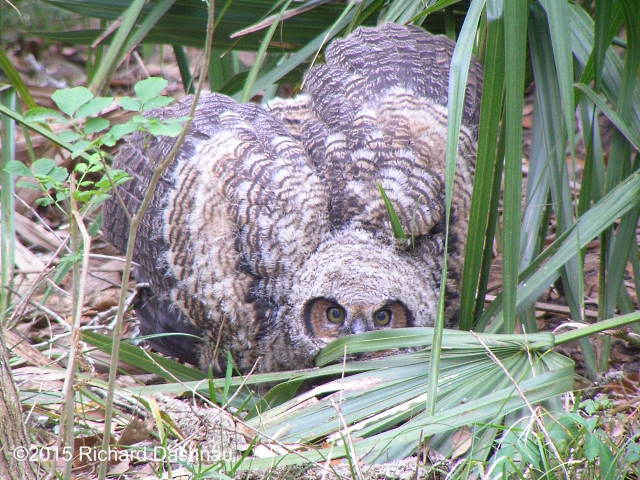 -------
-------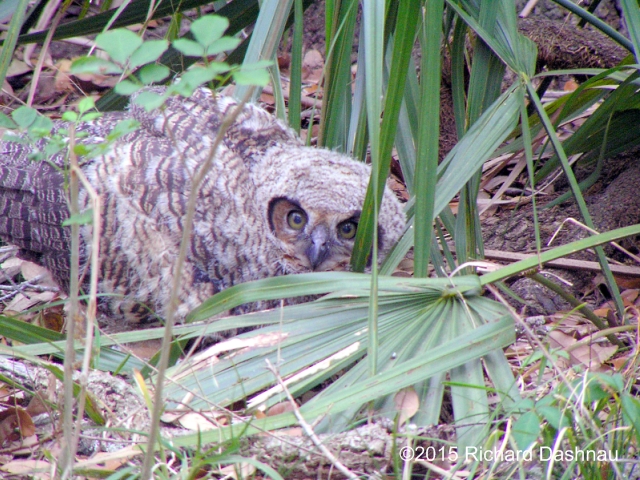 --
--
-----
BACK
OFF--I'M BIG AND MEAN! ----
------------- OWL KEEPING ITS EYES ON ME.-------
March
14, 2004
The image below (THE LEE OF THE STONE) shows an adult Great Horned Owl.
A pair of these beautiful birds had nested in the park some weeks ago.
I finally got over to
see them Sunday, the 14th. I'm kicking myself for
not getting over there sooner, because it was raining most of the day
Sunday.
I tried to take some pictures, but my lenses kept fogging up.
But, I was
able to salvage the shot below for the RICKUBISCAM. The caption I used
for that picture, "the lee of the stone", is from the animated movie
The
Secret of NIMH, and is where the
"Great Owl" tells Mrs. Brisby (a mouse)
to move her house.
Once
again, I'm impressed by the diversity of animals one can see at Brazos
Bend State Park. Here are two more pictures of the adult owl (see
BEAUTIFUL,
and STILL BEAUTIFUL, below).
I was disappointed in my pictures, so
I went back to the park Monday (March 15). I had already had the day
off,
since I was planning on filming alligator mating activity (but because
of the rain,
I didn't try). The day was clearer, but the adult owl wasn't
in a clear spot for me to catch her. I was able to
catch a picture
of one the the young owls, though, as it looked down at me from the tree
(see ARE YOU FOOD?, below). By the way, the two young owls had flown to
the next tree, when the day before all three were in the same tree.
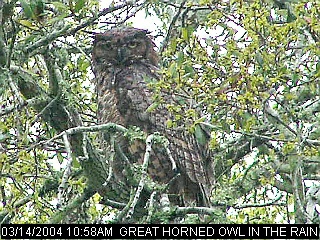 -
-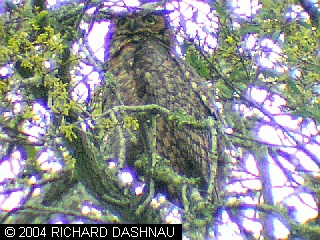 --
--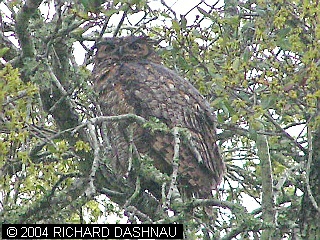 --
--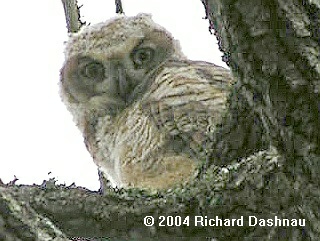
THE
LEE OF THE STONE
BEAUTIFUL!
STILL BEAUTIFUL!
ARE YOU FOOD?
--------------------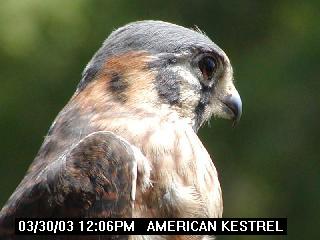 ----------
----------
AMERICAN KESTREL
March
30, 2003
Above is a picture of the American Kestrel that we have at
the park.
Isn't it beautiful? This is a captive bird, obtained from a
rehabilitator
only after the correct permits had been
applied for and granted (and this
is a state organization!). This Kestrel's wing was severely
damaged
some time (years) ago by contact with a power line, rendering the
Kestrel
unable to fly ever
again. This is the only reason that this fine animal
can be legally kept at all. So, DON'T EVEN THINK
ABOUT
IT!
-----
Brazos
Bend State Park
The main page.
Brazos
Bend State Park Volunteer's Page The
volunteer's main page.
Go back to my home page, Welcome
to rickubis.com
Go
back to the RICKUBISCAM
page.
Go
back to the See
the World
page.





























































